Worship Alternatives Items - Other/Hunger
Worship Alternatives MAIN |
Worship Alternatives ART
Worship Alternatives SERMONS | Also helpful: Quotes and Art
Index of Publications by Theme/Season
WORSHIP ITEMS
To find your choice, click on the title or key the item number into your "find" function (usually control-F). Or simply scroll down to browse.
NOTE: Some graphics are screened, so they look light. That allows you to overlay text on them.
For How to Use This Resource and Helpful Hints, go to MAIN page above. Some items also have a PDF version, which shows a design of text and graphic together.
This collection is a continuation of Spirit of Simplicity: Quotes & Art.
Items containing accompanying art/graphic end '+ART.' The art can, of course, be used with other text of your choice.
Table of Contents
- Prayers, Hymns, etc. - #150's
- Quotes - #150's
- Simple Gifts
- Notes on Church Music
- Various
- A Prayer for the World by Lee McKenna DuCharme - #353 (text) +ART
- A Prayer for the World by Lee McKenna DuCharme - #353 (PDF) +ART
- Give Us This Day Our Daily Bread -- an interpretive service by the Baptist Peace Fellowship youth - #354 (text) +ART
- Give Us This Day Our Daily Bread -- an interpretive service by the Baptist Peace Fellowship youth - #354 (PDF) +ART
- I met Jesus one time in Chicago - #355 (text) +ART
- I met Jesus one time in Chicago - #355 (PDF) +ART
- Peace Prayer - #356 (text) +ART
- Peace Prayer - #356 (PDF) +ART
- Pooh, Age Eleven by Elizabeth Daniel - #357 (text) +ART
- Pooh, Age Eleven by Elizabeth Daniel - #357 (PDF) +ART
- Dance with Us by Martha Barr - #358 (text) +ART
- Dance with Us by Martha Barr - #358 (PDF) +ART
- Angels Unaware - #359 (PDF) +ART
- When I Thought Like a Child by Elizabeth Daniel - #360 (text) +ART
- When I Thought Like a Child by Elizabeth Daniel - #360 (PDF) +ART
- The Voice in the Temple by Katie Cook - #361 (text) +ART
- The Voice in the Temple by Katie Cook - #361 (PDF) +ART
- Beatitudes for the Weary Christian by Katie Cook - #362 (text) +ART
- Beatitudes for the Weary Christian by Katie Cook - #362 (PDF) +ART
- A Prayer for Shalom by Heidi Baxter - #363 (text) +ART
- A Prayer for Shalom by Heidi Baxter - #363 (PDF) +ART
- Call to Worship by Rachel Hunter - #364 (text) +ART
- Call to Worship by Rachel Hunter - #364 (PDF) +ART
- Pastoral Prayer for Peacemakers by Richard Moore - #366
- My Rite of Communion by David Sparenberg - #367 +ART
- Confession to an Untamed God by Bob Darden - #368
- God of the Apple Crate by John S. Ballenger - #369
- For Such a Time As This: a litany by Jerene Broadway - #370 +ART
- I Saw a White Buffalo by Katie Cook - #371+ART
- Weeping and Hoping: a litany by Rachel C. Hunter - #372
- Sacrifice by Heather Oldham - #373 +ART
- Funeral Sermon by Ken Sehested - #374 (text) +ART
- Funeral Sermon by Ken Sehested - #374 (PDF) +ART
- HUNGER Emphasis 40-day Lenten Calendar
- Mommy, I'm Hungry: A Children's Sermon by Jeffrey Zurheide - #400
- Sacred Dance: Connecting the Body, Mind, and Spirit in Worship by Jessica Hastings Sehested - #401 +ART
- Hungering for Justice: A Litany by Katie Cook - #402
- Beans, Rice, & Cappuccino by Michele Perry - #403
- The Least of These: A Litany by Katie Cook - #404 +ART
- The Banquet Table: Poem and Reading by Michelle Perry - #405 +ART
- How He Broke the Bread: a dramatic reading for youth by Katie Cook - #406
- Feast from a Snack - A Monologue for a Child by Mark McClintock - #407
- I Just Want You to Know I'm Here - A Monologue by Katie Cook - #408
- May We Be Uneasy by John Stewart Ballenger - #409
- Remind Us of Your Face: A Responsive Call to Awareness by Daniel G. Bagby - #410 +ART
- Change for the Children: A Hymn for Children's Sabbath, words by John S. Ballenger - #411 +ART
- Jesus and Children: A Sermon for Children's Sabbath by Mark McClintock - #412
- Hungry for Hope: Children's Activity / How We Created a Day Camp on Hunger by Megan Sims and Katie Cook - #413 +ART
Other (Non-Seasonal)
Hunger
Worship Items
Other/Hunger (Non-Seasonal)
PRAYERS, HYMNS, etc.
#150A Truthful Prayer Before Meals
I am sorry God for my intentional and unintentional participation in the current world market that has brought this food produced often through environmentally dangerous and negative farming practices, packaged in resource and environmentally unfriendly containers and harvested in many cases by underpaid, abused migrant and alien labor to my table-a table at which I often consume food in unnecessary amounts and even waste it.
As penance and in hopes of redeeming myself for participation in this daily tragedy which contributes to the unequal distribution of the bounty you do supply, I will strive, with the help of your grace, to use the energy created by this food in my body to serve someone other than myself and, whenever possible, those in greatest need.
God, please continue through the Holy Spirit, to work with me on my conversion and awareness so that tomorrow I may buy less and eat less. If I accomplish this, my prayer of thanksgiving can truly be one of simple thanks rather than a confession of my indulgence and the over importance given to me as a first-world consumer so obviously demonstrated by the over abundance of out-of-season, imported, transported and over packaged food on my table.
May God forgive me for what I am about to do.
(submitted by John Sentovich from a friend)
#151
Consumer's Prayer
Dear God, please don't let me lose my aspirations and my soul in pursuit of the American Dream. Don't let me sell myself and my ideals to the Moral Majority.Please don't let me wake up one day with three kids in a mostly white neighborhood in Suburbia, USA, driving a minivan to and from parent-teacher meetings and soccer games, and realize that my life has been summed up in the offspring I've borne for my accountant husband. Don't let me become enamored of celebrities and their fickle fame and their knobby collarbones and their 48-hour Guaranteed Weight Loss Drinks. Don't let me wake up one day and realize that I've become a warmongering, mindlessly obedient, commercial whore who doesn't think about CFC emissions, or oil spills, or sweatshops, or munitions factories, or the rainforest being destroyed for domesticated animals and the paper hat we throw away. Please don't let me become completely desensitized. Forgive us our sins and grant us the wisdom to see the truth. And Lord, please remember not to let me wake up one day and realize that I hate myself.
Makenzi Henton, Mandeville, Louisiana
Adbusters, Nov/Dec 2003, issue #50 (no page numbers given). Used by permission.
#152
Is This the Blood of Christ?
I wanted to let you know that Adbusters has inspired a series of conversations in a small alternative worship community in North West London, culminating in a fervor for action. We sit in a circle and pass around a glass of Coca Cola, each sipping some as we read these words:"Is this the blood of Christ, or the blood of bottlers mysteriously disappeared in Coca Cola's Colombian plants in union battles? Or is it the blood of malnourished babies, after Zambian mothers are convinced by glossy advertising that Coca Cola is the best thing to feed their children? Or perhaps the blood of malnourished teenagers in Rio, who became vitamin deficient after drinking too much Coke?
"Maybe it symbolizes our blood, with our insides rotted away by the 13 lumps of sugar in a 330 ml can, and an acidity strong enough to dissolve teeth and bones. 'Coca Cola, The Real Thing."'
We pass a glass of water around the group, each taking some as we read these words:
"Water is the real thirst quencher, source of life and well being. 'I am the water of life,' a man said, over 2000 years ago, but was his water prepackaged, patented, privatized and paid for? This purity, this necessity for survival is out of reach of 200 million people. This number will double in the next 20 years ....
"This water, then, also has the taste of blood, yet this is perhaps, the real thing, reminding us that we need to commit to the substantial, the necessities of life in a struggle for the 'real thing' to become reality."
James Trafford, London Bible College
from Adbusters May/June 2003, No.47 (no page numbers given). Used by permission.
#153
Hymn: Bigger Barns
(The Parable of the Rich Fool in Luke 12:13-21)Sung to ABERYSTWYTH 7.7.7.7 D ("Jesus, Lover of My Soul")
"Bigger barns are what I need!" So a rich man said one day.
"From my worries I'll be free when my wealth is stored away."
"Fool!" God said, "Today you'll die! Will your wealth mean anything?
All life's blessings really lie in my life that wealth can't bring."
"Bigger barns are what we need for our money, gadgets, more!"
Lord, we're tempted to believe having wealth, we'll be secure!
Somewhere children cry for food or to have a doctor's care.
Can our bigger barns be good when poor neighbors know despair?
God of love, we long to know what will make us truly blest.
Jesus taught us long ago wealth won't give us peace or rest.
You are our security! Safe in you, we serve, O Lord.
May we find we're rich indeed when we're sharing with the poor.
(Inspired by the August 5th, 2001, lectionary's gospel text.)
Tune: Joseph Parry, 1879.
Text: Copyright (c) 2001 by Carolyn Winfrey Gillette. All rights reserved.
#154
Hymn: The Earth Is the Lord's
Sung to ST. DENIO 11.11.11.11 ("Immortal, Invisible, God Only Wise")"The Earth is the Lord's and the fulness thereof."
Creation reminds us, O God, of your love.
By grace we are learning, as year leads to year,
We're called to be stewards, your caretakers here.
Your rainforests nurture the world that we share.
Your wetlands give animals shelter and care.
Your coral reefs cradle the life of the sea.
You've shown us, in love, what your good world can be.
Too often, O God, we abuse your good earth.
We fail to remember its beauty and worth.
We take from creation much more than we need,
We threaten your world through indifference and greed.
May we be good stewards of all that you give,
Protecting creation wherever we live.
May we be a church that renews and restores
And lovingly cares for this earth that is yours.
Tune: Welsh Folk Hymn, Adapted in Caniadau y Cyssegr, 1839
Text: Copyright (c) 2001 by Carolyn Winfrey Gillette. All rights reserved.
305 South Broadway, Pitman, NJ 08071 Phone: (856)-589-8444
Email: Bruce.Gillette@ecunet.org
You are welcome to share the hymn(s) with neighboring pastors or other online friends, but please include the copyright and contact information.
Please drop us an email note to our personal user box for permission to use the hymn since Carolyn does like to know who are using her hymns. Thank you.
Carolyn Winfrey Gillette is the co-pastor of the First Presbyterian Church in Pitman, NJ and author of "Gifts of Love: New Hymns for Today's Worship" (Geneva Press, 2000). A complete list of Carolyn's hymns, including links to a dozen of the hymn texts posted online, can be found at http://www.firstpresby.org/hymnlist.htm
Bruce & Carolyn Winfrey Gillette, Co-Pastors
First Presbyterian Church, 305 S Broadway, Pitman NJ 08071
Office Phone: (856)-589-1050 Home Phone: (856)-589-8444
Email: Bruce.Gillette@ecunet.org
Church Fax: (856)-589-1051
Church website: www.firstpresby.org
#155
Beattitudes for Christian Peacemakers
by Kathy Kern(for the final worship at Christian Peacemaker Teams Retreat). From Christian Peacemaker Teams "Signs of the Times," fall, 2000.
Blessed are those who recognize their spiritual inadequacies -- for they will cut their co-workers some slack, and be respectful of the faith traditions of others.
Blessed are those who mourn -- for they will be able to enter into the lives of the oppressed and exploited.
Blessed are the meek -- for they will make room for their co-workers to express new ideas, move in new directions, make mistakes.
Blessed are those who hunger and thirst for righteousness -- for they will be able to put the jealousies, quarrels and irritations aside to focus on challenging the violence of the domination system.
Blessed are the merciful -- for they will give their co-workers a second chance after dumb mistakes and hurtful words and behaviors. And maybe, just maybe, they will receive mercy.
Blessed are the pure of heart -- wherever they may be.
Blessed are the peacemakers -- for sometimes, to the grace of God and the prayers of the faithful, they actually managed to make peace.
Blessed are those who are persecuted for righteousness sake; who are interrupted, slighted and denigrated by their co-workers; who are called "squalor on the face of the earth," Capitalists and "Nazis;" who are spit on, attacked and slandered by agents of the status quo; who developed a variety of interesting tropical diseases; who are reviled for coming from a life of privilege; who bear scars from a life of deprivation; who are laughed at for saying stupid things; who are willing to continue working for peace after they have been humiliated; who choose to witness and participate in the pain caused by atrocities, massacres and systemic violence.
Rejoice and be exceedingly glad, for you are a part of the cloud of witnesses who will bless the peacemakers coming after you; for you are the salt of the Earth; you are the light of the world; and yours is the kingdom of heaven.
#156
I Was Hungry . . .
I was hungry and you blamed the Communists,I was hungry and you landed on the moon,
I was hungry and you told me to wait,
I was hungry and you set up a commission,
I was hungry and you said, "so were my ancestors,"
I was hungry and you said, "we don't hire over 35,"
I was hungry and you said, "God helps those . . ."
I was hungry and you told me I shouldn't be,
I was hungry and you told me machines do that work now,
I was hungry and you had neutron bombs and Trident submarine bills to pay,
I was hungry and you said, "the poor are always with us."
Lord, when did we see you hungry?
(submitted by Karl Lehman, from Voluntary Simplicity Study Action Guide. Paraphrased from "Justice and Service," Issue nos. 3 & 4; 1973.)
QUOTES
#157Simple Gifts
'Tis a gift to be simple,
'Tis a gift to be free,
'Tis a gift to come round
where we want to be,
And when we find ourselves
in the place just right
We will be in the valley of
love and delight.
Old Shaker Hymn (from 'To Celebrate')
"The superfluities of the rich are the necessaries of the poor. Those who retain what is superfluous possess the goods of others." St. Augustine
"O God,
To those who have hunger
Give bread;
And to us who have bread
Give hunger for justice."
"Celebration is a forgetting . . . of ego, of problems, of difficulties, in order to remember the commone base that makes another's sufferings mine and in order to imagine a relief of that suffering. There can be no compassion without celebration and there will be no authentic celebration that does not result in increased compassionate energies." Matthew Fox
"Any 'Christians' who take for themselves any more than the plain necessaries of life, live in an open habitual denial of the Lord. They have gained riches and hell-fire." John Wesley
"All celebration is like a great 'Alleluia' and song of thanksgiving, in which we remember before God all those who cannot celebrate." Jean Vanier
(submitted by Karl Lehman)
#158
Notes on Church Music
based on Voluntary Simplicity
1. Avoid choir robes. The theory of "uniformity of appearance reflects uniformity of purpose" is bunk. Wear clothes from the developing world or modest Western clothing, possibly to reflect the liturgical season. Robes, like men's ties, are symbolic of domination.
2. Choirs, sing in the language of the congregation, so that the words are understandable. Or provide a translation in the bulletin and call attention to it. Avoid polyphonic settings unless words are in the bulletin or are very repetitive, like Amen or Alleluia. Otherwise the nonsense syllables that result convert choral music into instrumental music.
3. Instrumental music should be primarily hymn tune based, allowing people to participate, even when not singing, by following the tune (and words) in their head or reading them if hymnal numbers are given.
Gerald Iversen, 4/99
"Solidarity is more than a feeling of compassion or the desire to give to charity. Solidarity is essentially the will to treat every person as a beloved family member."
"Doing Justice" from "Ministry and Liturgy," March, 2001. Also in "Solidarity: Owning the Troubles and Joys of Others," p. 13.
#353

A Prayer for the World
by Lee McKenna DuCharmeOh Holy One, Spirit God,
You, who satisfies the hungry heart
You, who provides words to poets:
Oh God of the Exiles
We are your people;
we feel that this is no longer our home
we're not sure at all that we like life
on the edge.
We know too well the threat of the cross;
we have glimpsed the danger of the resurrection;
we have taken tentative steps on Jubilee's road to costly liberation.
And we're not sure we like it.
How can we sing the Lord's song?
The happy tunes of a gospel of certitude
and privilege
have long been dissonance to our ears.
Yet still we feel the urge to hang our harps
on trees:
Jubilee is hard saying!
Who can hear it?
Who can accept it in this culture of Seinfeld
and SUVs
and self-cleaning appliances
and not feel offence?
But yet, we know, deep in ourselves,
that you do hold the words of life.
We see your church in foetal position,
desperate to protect what it used to be
its running after order
in a disordered world,
its race for Easter without Good Friday,
And your poets yearn.
Widows and orphans die in the streets,
canaries in coalmines;
The IMF and the World Bank and the WTO organise our debts
oblivious to Jubilee.
We stand in the 49th year:
The people of Kosovo and of East Timor cry
for their return
to the lands of their ancestors
The people of Aceh and West Papua dream of life
out from under the hand of oppression
The children of Sierra Leone learn the craft
of war and dismemberment,
their childhood the stolen property of overlords
Boatloads of Chinese labourers, indentured,
sold into slavery in their search
for the Golden Mountain,
sweating out their lives so that we can enjoy cheaply
the benefits of the "free" market
The people of Sudan and Nagalim die
in their hundreds of thousands,
silent to our ears
Ugandans, Zambians and Malawians
bury entire generations of AIDS victims
never dreaming of life-extending drugs
Women, children and men.
God! How can you can stand it!?
wander homeless in the streets
of the cities
of the richest countries
in the world.
We lie shackled to Empire that invites us
into denial, despair, amnesia
and when that happens,
your people become
shoppers.
Empire's mantra tells us to
GO ALONG
if we want to
GET ALONG;
Our churches sit dormant under the narcotic
of liturgies
designed to accommodate the people to Empire,
producing custodians of the dominant power,
making them feel good enough to carry on,
but not guilty enough to do anything dangerous.
In the face of the demands of Jubilee,
we sometimes find ourselves
acting and believing that there is no one greater than Nebuchadnezzar.
O God of the Exiles,
give words to your poets
For poets make no concessions to Babylon;
They write poetry that undermines
the prose of Empire;
They dance;
Poets speak the ordinary things of faith
that the Empire considers outrageous.
Give strength to your people who believe. . .
that we are saved for the world, not from it;
that peace, like war, is waged;
that discipleship means being redemptively involved in the world's pain
at some cost to ourselves;
that, if not outrageous,
poetry has no power to give life;
that the principalities and powers are not
in charge of this world.
Give words to your poets
these repairers of breaches
and restorers of streets to live in
your poets
who know that, while words of release
are dangerous,
they emancipate.
They give life.
Because of Christ
in whose name we pray. Amen
Lee McKenna duCharme is an international organizer for peace and justice, and an interim pastor in Toronto, Ontario. This prayer was first delivered at Oakhurst Baptist Church, Decatur, Georgia in October 1999.
(from Baptist Peacemaker, Volume 20 Number 1, Spring 2001)

#354
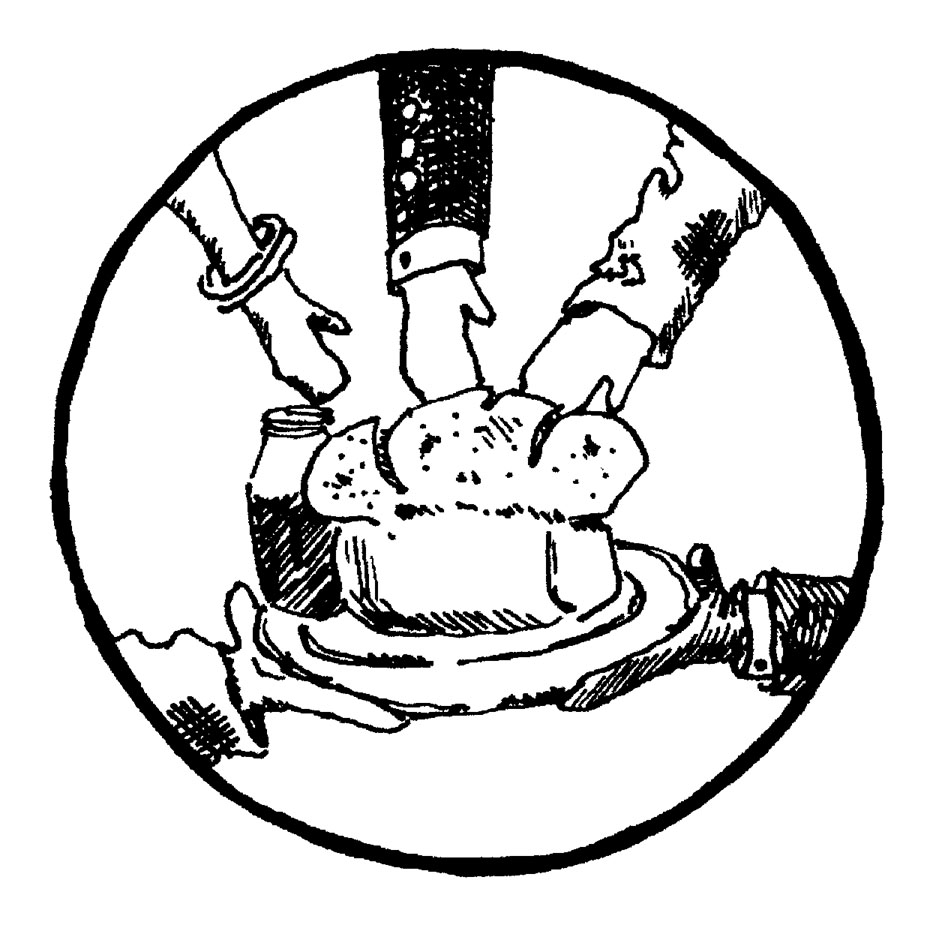
Give Us This Day Our Daily Bread
An interpretive service by the Baptist Peace Fellowship youthEditor's note: The following is taken from the final worship service at the 2000 summer conference of the Baptist Peace Fellowship of North America (BPFNA) in Winston-Salem, North Carolina. It was planned, written, and led by the youth. Special thanks go to youth leader Stephanie Wyatt for gathering these writings and sending them to Baptist Peacemaker.
Call to Worship
by Jon Buttry
Reader 1: O God, we come together from different places, from the ends of the earth and from across the street.
Reader 2: We gather here for one common dream which we all share in the depths of our hearts and minds: peace.
Reader 3: When we unite, we set aside our differences and respect each other simply because we are all people, we are all individuals, and we are all in this together.
Reader 4: Upon gathering, the seeds of our ideas are fertilized with other's contributions. With our determination to carry out God's will, these ideas evolve and shape the world of tomorrow.
Theme Interpetation
by Trisha Byers
First Offstage Voice: Give us this Day Our Daily Bread.
Second Offstage Voice: You are an ambassador on the veranda of the U.S. embassy in some foreign country. A waiter is about to request your order. You look out on the street filled with tattered children scheming for money, food. The waiter's child is one of them.
Response
I look at these children begging and I feel so helpless, being the Ambassador of a very wealthy and powerful country and not being able to go out of this building and help these kids.
How can a country like ours be completely covered in wealth and still want more power and money, while in other countries people's daily life is begging?
We have so much food and money, if we would stop being so greedy and think about other countries – especially Third World countries – we could stop hunger in so many places.
The only way our country will ever give help to another country is if they give us good trade for it, and if a country doesn't have good trade the U.S. just shoos them away like flies.
I think we should all stop thinking about ourselves and how much we suffer, and consider that what we do have is so much more than other countries, and take time to sacrifice some of it to those countries.
Give Us Our Daily Bread
a short drama
by Anna Betton and Sarah Burkett
Ask a player to dress like a homeless woman and stand to one side of the stage, while the two speakers, Anna and Sarah, stand on the other side. Anna and Sarah are dressed like ordinary teenagers.
Scene I
Anna: Hey Sarah, look at that old rag over there. She thinks she actually has food in those bags of hers, HA, that's funny!
Sarah: Anna, you are confusing me. I thought God taught us to take in everyone as if they were part of us. To reach out our hearts, and to help those in need.
Anna: God? Who cares about him? I mean, do you have any proof that he is really there?
Sarah: God is in my heart, and yours, and God tells us that we should lift our hearts to that woman as well as anyone who needs a friend.
Anna: Sarah! I think I am beginning to understand. So where should I go from here?
Sarah: Well Anna, I think we should start right over there with that woman. We should work to fill her bags with the fruits of the spirit and bring her into God's life, and fill her with God's love!
Anna: Great! LET'S GO TO HER!
Anna and Sarah go to the homeless woman and offer food to her.
Scene II
Anna: I am so glad that you made me realize how important God's love is. I have felt more secure knowing that God is there for me. Thanks Sarah!
Sarah: No problem, I just wish that EVERY ONE could realize the work of our Creator's love.
Anna: Well it is a shame that EVERYONE does not believe, but we should do everything we can to spread God's quilt of love.
Both (Sarah & Anna): AMEN
What's Up With the Line at Mickey D's?
a drama by the BPFNA youth
Scene: Two young, beautiful teenage women walking along the sidewalk, pausing alongside a McDonald's Restaurant
First Teen: I'm hungry!
Second Teen: I don't want any greasy fries. Besides, look at that line.
First Teen: What's happening to the world today?
Second Teen: Fast food has led to the decline of family meals and promoted cultural assimilation. Now everybody eats the same things, day after day.
First Teen: Wow! I hadn't really thought of it quite like this before, but you're right. Families don't even take the time to pray! They are too consumed with themselves and their time to worry about things like that.
Second Teen: Yeah, they are so rushed they don't take time to interact with each other, let alone God.
First Teen: Let's go; I'm not so hungry anymore.
Communion Introduction
by Jon Buttry and David Broadway
Imagine two scenes: one is heaven, one is hell. In both scenes you can see a great banquet table covered with all the food one could possibly want. (You can elaborate if you want: fried chicken, crab cakes, hamburgers – fill in your favorite foods.)
In both scenes there are people on each side of the table facing one another. In both scenes the people have extremely long arms. In fact their arms are so long they cannot reach their mouths with the food placed before them.
In hell, the people are angrily trying to reach their mouths with the food. They are each jockeying for the best position to try to get the food into their own mouths, disregarding their sisters and brothers. Thus, they are starving in the midst of a great feast.
In heaven, the people are joyous. The long arms are not a problem because they are feeding one another. They are celebrating the feast fully because they are sharing.
Today we would like to simulate this scene of heaven by serving each other communion. If you will please prepare to stand in lines facing one another, we will participate in the Lord's supper by serving it to our neighbors.
May it truly be on earth as it is in heaven.
Let the Feast begin.
This service is from the award-winning department called Peace Soup in Baptist Peacemaker. Peace Soup is affectionately named after a youth newspaper created during the 1999 "peace camp." (from Baptist Peacemaker, Volume 20 Number 3, Fall 2000)
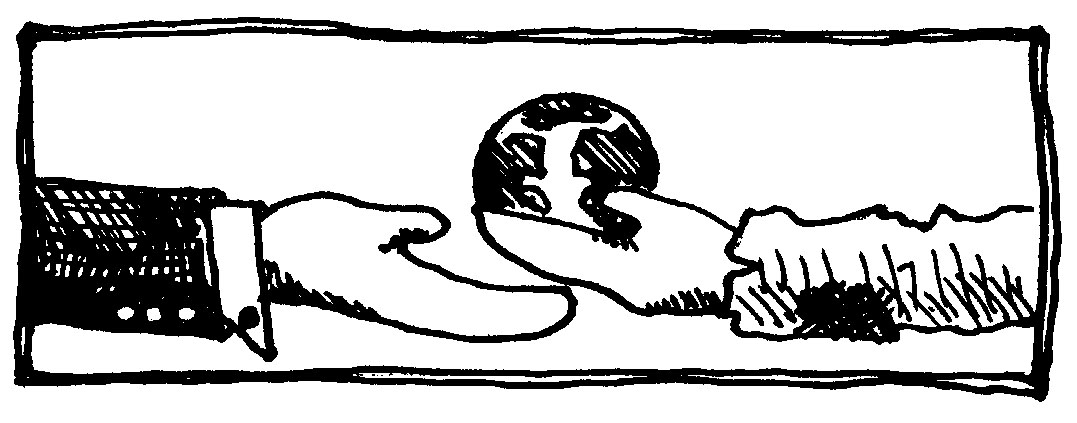
#355
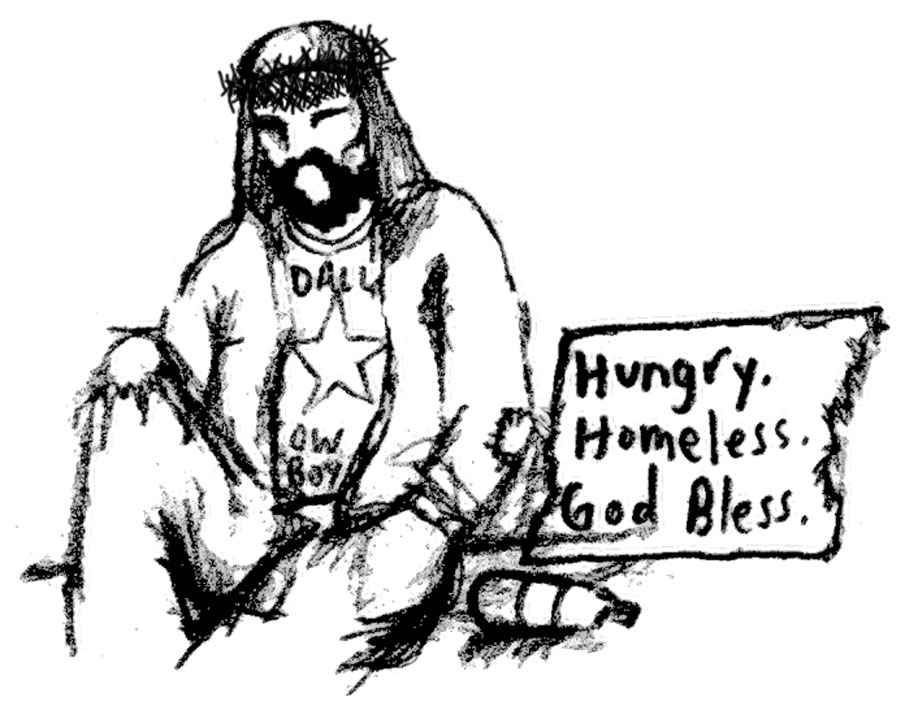
I met Jesus one time in Chicago
I met Jesus one time in Chicagoand he threatened to kill me. Well, I mean, he told me how he could. He kind of walked up to me and was mumbling and sort of struck up a conversation. It was really one-sided because he was homeless and I was twelve. He had been in Korea during the war and hadn't taken a bath in three weeks, or since May, he said, and he couldn't remember which.
He could kill a man thirteen different ways with his bare hands and wanted to know if I wanted to see. I held still because he told me to and because I was scared. He was soon taken away by the Compassion Ministries people.
I never saw him again that week, until the last day at the soup kitchen. He was sitting alone, but not mumbling. I was still shaken from our conversation. You don't expect to be accosted by a schizophrenic at age twelve, especially when you're white and from a small private school in Central Texas. But I saw him and it was Jesus.
I went and refilled his drink. I filled the glass of my friend Jesus. I sort of sat down and he looked up at me with a mix of clouded recognition and shame. I said, "Hi." And he didn't say much but finally whispered, "I'm sorry." He said, "I'm sorry but I was drunk and when I drink I relive my life. I'm sorry. I hate it, and I'm sorry. Sorry."
I refilled his glass, and it hit me. Hard. Right then. I wasn't sitting across from Jesus; he wasn't testing my compassion. That was a longer while ago. I realized that it was me, with Jesus inside. I was sitting across the table from a smelly homeless man and I was giving a drink as Jesus, with Jesus, and to Jesus.
I never found out his name.
This art and reflection are by Van Darden, who was 15 and a sophomore at Vanguard Preparatory School in Waco, Texas. This reflection, along with the art was published on the Peace Soup page, an award-winning regular department in Baptist Peacemaker which features writings, photographs, and drawings by youth. (from Baptist Peacemaker, Volume 21 Number 1, Spring 2001.)
#356
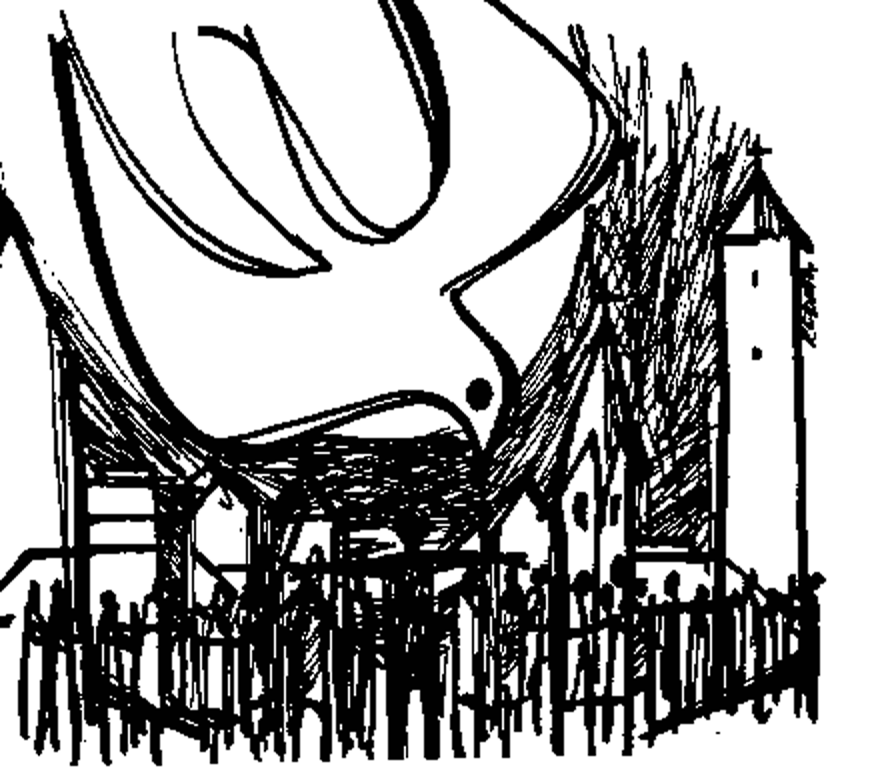
Peace Prayer
God of Peace,If we have assisted in transforming the world that You created from a perfect garden to a place where children make bombs to kill other children, forgive us. Please show us how to make peace.
If we have been accomplices in changing a world that you designed as a sanctuary for your many different children into a place where governments kill those who are different, forgive us. Please show us how to make peace.
We know that our actions bring sorrow to you again and again. You look down upon the war zones of our inner cities. This world is not what you created it to be.
You look down upon the city of Jerusalem and the mountainsides of Central America. This world is not what you created it to be.
You look down upon our communities, our churches, our families. This world is not what you created it to be.
By now, you must think that we are turning your whole creation into a skull-shaped world. We are warriors, searching for peace. Turn us around, O Lord.
Make us instruments of your peace, this day. Amen.
written by Allen Reasons, who, at this writing, was pastor of a church in Houston, Texas. The art on this page is used courtesy of the BlancoCruz Franciscans.
(from the cover of Baptist Peacemaker, Volume 21 Number 1, Spring 2001)
#357
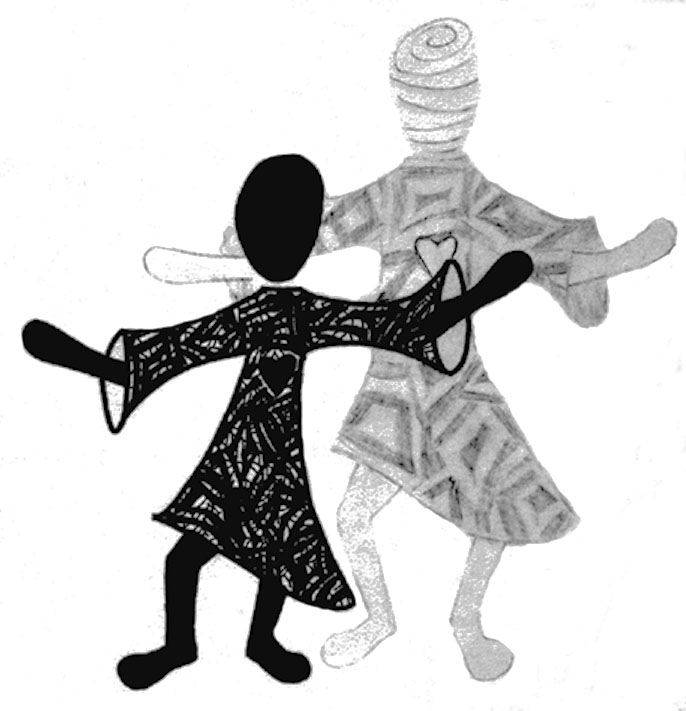
Pooh, Age Eleven
by Elizabeth DanielPooh told me yesterday
that his life will end in suicide.
he said this as his laughing eyes
surveyed mine.
his carefully shaved head
relaxed in relief I had never seen in him.
he jerked unconsciously,
and looked off into the distance
that ended abruptly across the room.
and I saw
recognition twitching in his nose,
as he
stared at the brown walls
surrounding the space.
an easy irreverence hung in the air,
like a storm that would never come
but was always imminent.
its angry thunder
restlessly transformed itself
into the foggy laughter
of children.
and the eleven-year-old Pooh
lost his ancient
expression
and returned
to himself.
I watched
as he smiled and walked away.
Elizabeth Daniel, at this writing, was a senior at Vanguard Preparatory School in Waco, Texas. As a high school student, she volunteered at an after-school program for at-risk youth near an urban development project. Pooh is one of the friends she made there.
The art on this page is by Rebecca Ward, an art student at the University of Texas in Austin.
(from the Peace Soup page in Baptist Peacemaker, Volume 21 Number 2, Summer 2001)
#358
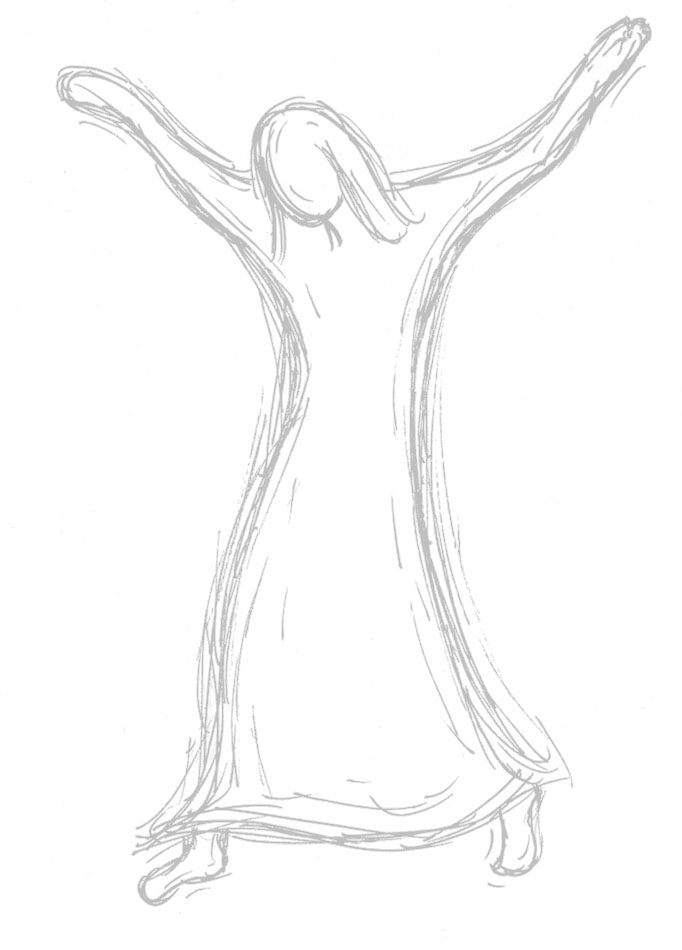
Dance with Us
Martha BarrSometimes, when we scan the room
-- and ourselves -- for You
we see You...seeing us!
Sometimes, when we hold each other
we feel You enfolding us.
Sometimes, when we sing
we hear Your voice.
Sometimes, when we preach
we hear Your Word.
Sometimes, when we cry
we taste Your tears.
Please, God...always dance with us.
Amen.
Martha Barr wrote this prayer as a benediction during the 2001 summer conference of the Baptist Peace Fellowship of North America. The art on this page is by Rebecca Ward, and depicts Jessica Sehested, a liturgical dancer for many BPFNA summer conferences.
(from the cover of Baptist Peacemaker, Volume 21 Number 3, Fall 2001)
#360

When I Thought Like a Child
by Elizabeth Danielteach me how to drink
the stars – bright mystery
show me how to see
just beyond the edges of my life
paint pictures
with rainbows on my earlobes
Dance
in the darkness of the night
wear clouds for shoes in the winter
reach
just past the horizon line
Dream, Child, dream
dream dreams beyond imagining
but never forget
to fly
when you can no longer walk
Elizabeth Daniel, at this writing, was a senior at Vanguard Preparatory School in Waco, Texas. She is now a student at the University of Chicago.
The art on this page is by Rebecca Ward, an art student at the University of Texas in Austin.
(from the Peace Soup page in Baptist Peacemaker, Volume 22 Number 1, Winter 2002)
#361
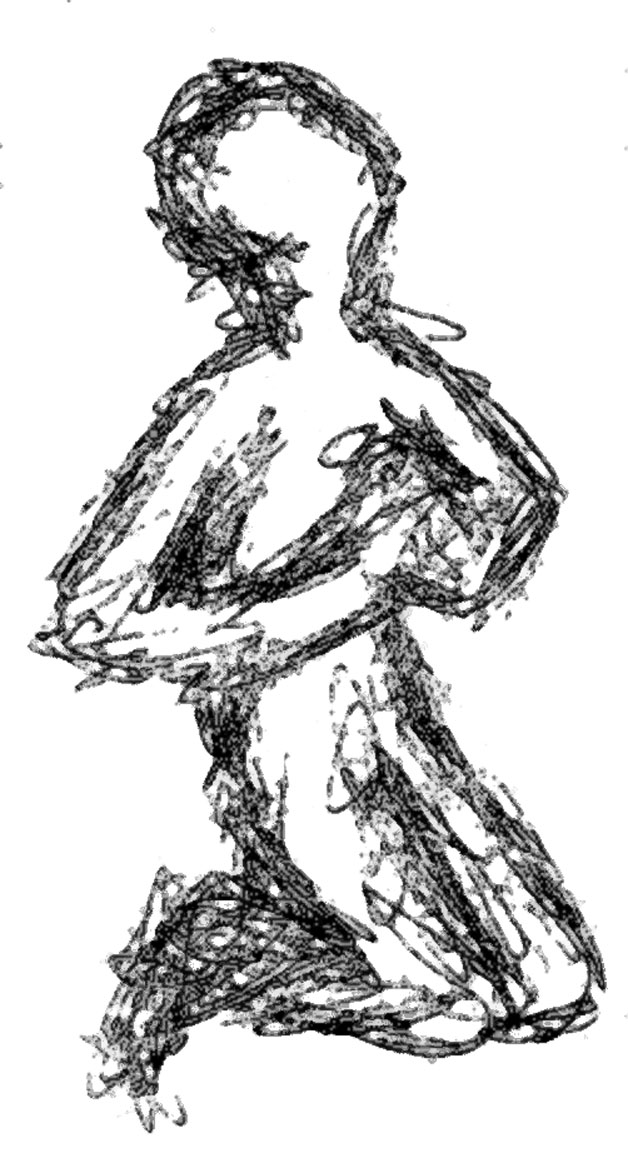
The Voice in the Temple
by Katie CookThis is the year that King Uzziah died.
There is brokenness and death all around us.
There is violence and injustice and hunger.
We have hatred in our hearts,
And we dwell in the midst of a people with hateful hearts.
We fear that our dreams and hopes are dying.
We believed that we were supposed to dream along with God,
But we wonder sometimes if it's worth all the pain.
We see evidence that the work is not in vain,
And we cling in the midst of our fatigue to those glimpses of truth,
We cherish those rumors of glory.
This is the year that King Uzziah died,
And we have come to the temple to weep.
We wait now to hear that word that will keep us going.
We wait to taste of the holiness of God,
The vision, high and lifted up.
We wait to hear that voice that we love so much.
Somewhere in the middle of our weeping we hear a question:
"Who will go out into a world such as this,
Where people suffer and die
And infant hopes are dashed against the rocks?"
And we search our hearts.
Are we ready for this task?
Are we worthy to go where God sends us?
Can we do this?
We feel too young. We feel too old.
We tend to stammer. We tend to fall down.
We each feel unfit in different ways.
But we have heard a voice, a beloved voice,
In the temple, where we went to weep.
This is the year that King Uzziah died,
And we have heard a voice in the temple.
May God give us grace,
May God give us courage,
May God keep us on the journey,
For we must go and tell the people what the voice has told us.
Katie Cook is the editor of Hunger News & Hope and Sacred Seasons, both Seeds of Hope publications, and of Baptist Peacemaker, a publication of the Baptist Peace Fellowship of North America.
(from Baptist Peacemaker, Volume 22, Number 4, Winter 2002.)
#362

Beatitudes for the Weary Christian
by Katie CookJoyful are those who know they are helpless,
For they rely on God,
And God's eternal Commonwealth is theirs.
Joyful are those who know sorrow and pain,
For peace and quiet joy will be theirs;
Gentle certainty will be theirs;
And strength will come to them in
abundance.
Joyful are those who do not tread on others,
Those whose words and deeds are gentle,
For they will be one with the new earth.
Joyful are those whose hearts break,
and whose spirits groan, for justice
in this world,
For they will see the great realm of peace
and justice,
And their quest will be accomplished,
And their dream will come true.
Joyful are those who respond to others
in need,
Who do not remember past wrongs,
For God will forget their wrongs
And respond to their needs.
Joyful are those whose hearts and minds
thirst for one thing,
And that is to walk in God's way
And to live in God's truth,
No matter how high the toll;
For they will bask in God's love.
Joyful are those who work for peace,
For they are God's children;
God is their Father, who provides for them,
And their Mother, who nurtures them.
Joyful are you who meet with hatred
because of your stand for justice,
Your reward will not be the punishment
of those who abuse you;
Instead, you will long for their redemption;
Instead, your reward will be to see
the Reign of God in its completeness;
Your reward will be to see God's justice
ruling all humanity and all creation,
And there will be no end to that era of justice.
Joyful are you who endure harsh things
because of the teachings of Christ;
You will know the endless government
of justice and peace,
The endless dominion of love and truth.
Be comforted in this,
for all who have so
spoken the truth
have been so abused.
All of you can be full of joy,
Because you have hope –
The hope of God's Commonwealth –
Where tears are wiped away,
Where pain is erased.
You will be in harmony with creation
You will see the everlasting domain
of justice, mercy, peace, and truth,
You will be in the presence of God.
You will look upon God's face, and not faint.
God's eyes will smile upon you;
You will sit in God's lap,
And feel God's embrace.
You will sit by the fire with God,
And you will rest.
Katie Cook is the editor for Seeds of Hope Publishers and also for Baptist Peacemaker, a publication of the Baptist Peace Fellowship of North America. This meditation is from the cover of Baptist Peacemaker, Volume 23 Number 2, Summer 2003.
art courtesy of CrisArt: Pagina cristiana
#363
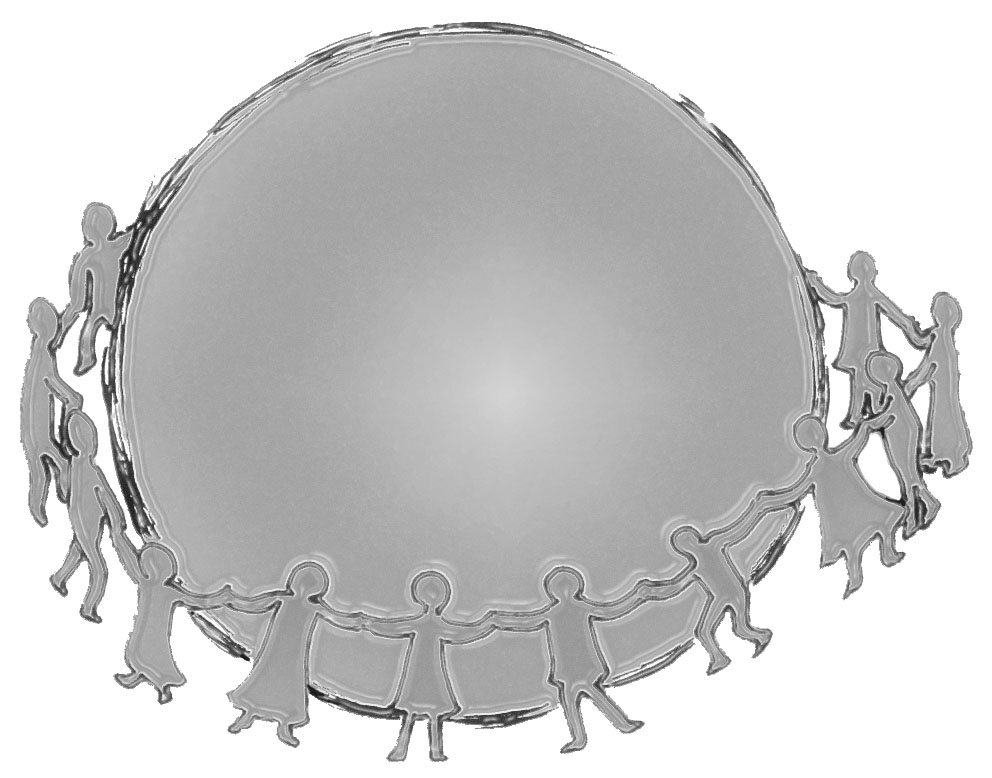
A Prayer for Shalom
by Heidi BaxterGod of Our Ancestors --
Abraham and Sarah,
Isaac and Rebekah,
Jacob and Leah and Rachel,
Bring us shalom. Let us not forget those who hurt by turning plowshares into swords and pruning hooks into spears. Let us not forget those who are trampled and left hungry. Help us remember those we overlook and tend to push aside. Help us be aware of when we ignore others' needs'.Bring us shalom.
Bring us shalom. Show us how to honor those with whom we disagree. Teach us what it means to live in true community. Increase our awareness of the subtleties of discrimination. Make us attentive to how hurtful our words can be. Help us remember that apathy is just as harmful as inaction.Bring us shalom.
Bring us shalom. Help us remember the women and children who faithfully followed your call: Rahab, the child king Josiah, Michal, Jephthah's daughter, the young shepherd David, Jael, the young boy Samuel, and Sisera's mother, waiting for her fallen son to return.Bring us shalom.
Create in us shalom. Let us live in Christ who welcomes us all, not just the good-looking, popular, or wealthy. May we learn that in Christ we transcend swords and spears, plowshares and pruning hooks. Bring us to abide in you; not just with you. Create with us shalom. Health, wholeness, salvation, justice, peace. Shalom and amen.
Heidi Baxter, at this writing, was a senior at Central Baptist Theological Seminary in Kansas City, Kansas with plans to graduate the next spring with a Master of Divinity degree.
#364
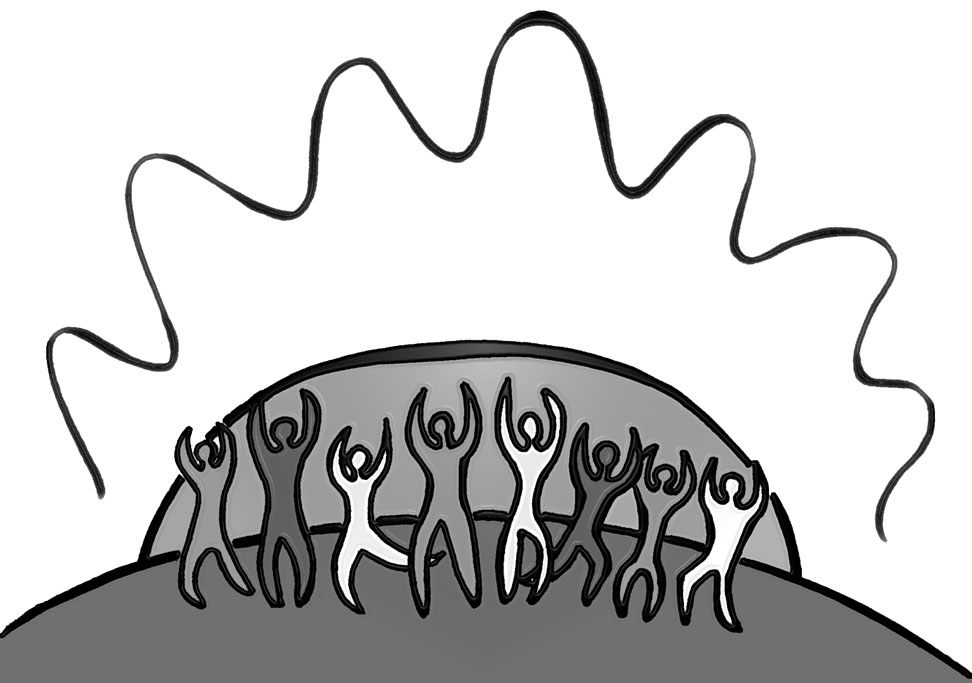
Call to Worship
by Rachel HunterFIRST VOICE: Out of past and present pain and suffering,
PEOPLE: We come to worship God.
SECOND VOICE: Who is with all those who suffer oppression.
FIRST VOICE: With all that this experience evokes in us,
PEOPLE: We come to worship God.
SECOND VOICE: Whose spirit groans within us in prayers too deep for words.
FIRST VOICE: From all our journeys of time and space and spirit,
PEOPLE: We come to worship God,
SECOND VOICE: Who has led us into our present and who beckons us into our future.
FIRST VOICE: To speak and hear the truth, and to commit ourselves to seek justice,
PEOPLE: We come to worship God.
SECOND VOICE: Whose truth sets us free, and who calls for justice to flow down like water.
PEOPLE: We come to worship God. Amen.
Rachel Hunter is a poet, a playwright, and a specialist in theatrical effects. At this writing she was living in New York City. She now teaches at The Meeting School in Rindge, New Hampshire.
This litany was the call to worship for the Saturday morning communion service during the 2003 summer conference (aka "peace camp") of the Baptist Peace Fellowship of North America, and was printed in Peace Soup, the youth page of Baptist Peacemaker, Volume 23, Number 3, Fall 2003. Art is by Sharon Rollins.
#366
Pastoral Prayer for Peacemakers
by Richard MooreIn a world that offers reasons to despair,
In a time of confusion and fear,
We turn our hearts to you,
O God, our Strength and our Redeemer.
In our world, power seems distant and remote
and the interests of the weak are often overlooked.
Certainly, it seems, one person – or one small church –
can't make a difference,
Can't right all the wrongs we see around us.
And yet, you have called us –
Called us out into the world
to give an accounting of our faith;
Called us into the streets
to proclaim your mercies
and announce your kingdom;
Called us into relationships
to heal what is broken
and restore hope to the hopeless;
Called us to speak your Gospel
and live your Good News,
to bring justice to a world that needs to believe;
Called us your friends, the beloved of God.
Empower us, then, O God,
to do the things that make for peace.
Let our witness make faith seem stronger than pipe bombs
And peace more compelling than tanks and suicide bombers.
We follow the war-maker out of fear,
Figuring which end of a gun barrel we'd rather be on.
But we are drawn to the peacemakers
Because of the vision they bring,
The world they make vivid before our eyes,
The healing we feel when that world is made real.
You are our peacemaker, O Jesus.
You are our vision.
Make us worthy of it.
And let us share in the privilege
Of joining hand to hand,
voice to voice, heart to heart,
In the forming of your kingdom.
Let your love prevail.
And let it begin in us.
This is our prayer.
Amen.
Richard Moore is youth minister for University Baptist Church in Austin, Texas.
(from the cover of Baptist Peacemaker, Volume 22 Number 2, Summer 2002)
#367
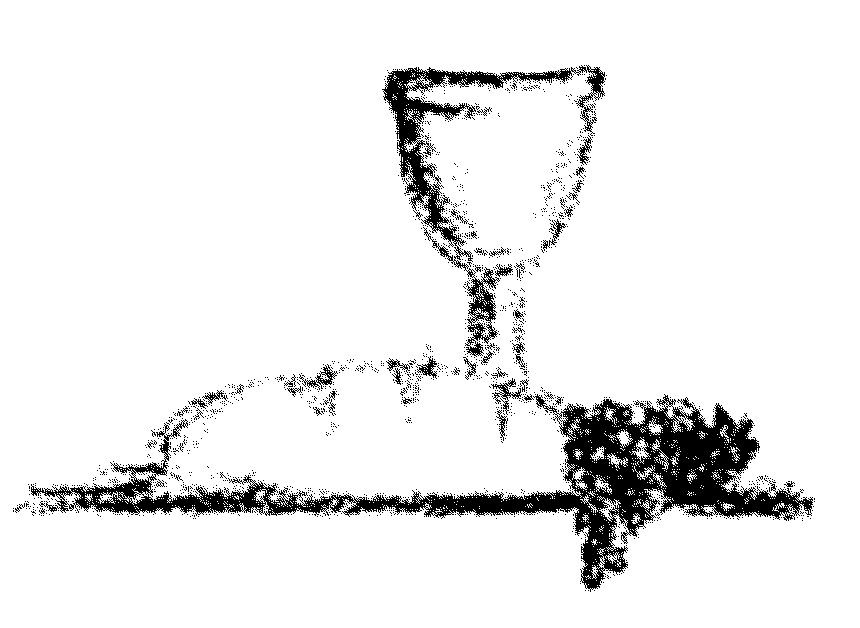
My Rite of Communion
by David SparenbergMay 12, 2004
I participate
in the beauty of the Earth.
And without violation.
I partake
of the wonderment
of this awakening day.
I drink in the wine
of morning breeze, sweetened
by the flowers of May.
I break and eat the
bread of Spring, seasoned
from life's garden.
This is my rite
of communion.
In this way,
I say no to war.
And to the evil death
in the minds of
deceptive men, who have
turned to a god who is
no god: an idol loveless.
And exacting judgment.
In this way,
my heart declares my
love of justice.
And my soul stands firm
in the prophecy of peace.
I turn out
to the dawn awareness.
And to my God who
creates out of love.
And who instills love even
in the eyes of those
suffering most. And who
tremble for their children's safety.
This is my rite
of communion.
In this way,
I say yes to yes.
And no to war.
David Sparenberg -- a playwright, poet, storyteller, stage director, Shakespearean actor and new novelist -- lived in Seattle, Washington, at this writing. This poem was printed in Baptist Peacemaker, Volume 24, No 2, Spring 2004. Art is by Rebecca Ward.
#368
Confession to an Untamed God
Bob Darden#369
God of the Apple Crate
by John S. BallengerRaise us to your glorious throne, our God,
that we might walk paths of wonder
and revel in the courts of Zion.
that we might with bowed head and whispered Hosannas
enter your presence
there to raise awe-struck eyes to see –
to see the gaunt face of the man behind the
Hungry Will Work For Food sign just off of I-35;
to see the sad eyes of those who
sit waiting at the food bank
when we dash in to drop this off
or pick that up.
And we think if YOU are King,
if YOU are Messiah,
if YOU are God,
forgive us, God, for
we know not what we do.
God sits on an old apple crate and
there is no throne more glorious.
God wears a ratty old baseball
cap to which no crown can compare.
And God offers us this same
transforming power
to make of our lives a witness
to that which only our richest
language can begin
to reach for.
Raise us to
your glorious throne,
oh God.
Amen.
John Ballenger is a specialist in worship and the arts. He lives, writes, and teaches in Atlanta.
#370
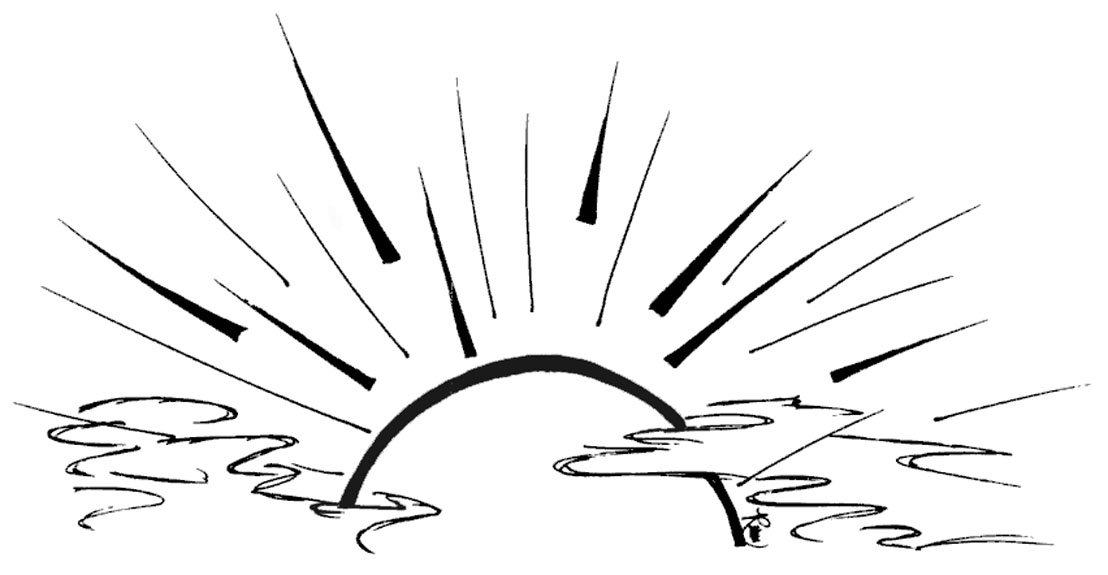
For Such a Time As This
For Such a Time As Thisa litany by Jerene Broadway
Leader: Perhaps you were brought to the kingdom for such a time as this.
People: FOR EVERYTHING THERE IS A SEASON,
AND A TIME FOR EVERY PURPOSE UNDER HEAVEN
Leader: A time to be born and a time to die
A time to plant and a time to harvest what is planted
People: A TIME TO KILL AND A TIME TO HEAL
A TIME TO BREAK DOWN AND A TIME TO BUILD UP
Leader: A time to weep and a time to laugh
A time to mourn and a time to celebrate
People: FOR EVERYTHING THERE IS A SEASON,
AND A TIME FOR EVERY PURPOSE UNDER HEAVEN
Leader: A time to hold each other and a time to refrain from embracing
A time to seek what we long for and a time to lose what we love
People: A TIME TO KEEP AND A TIME TO THROW AWAY
A TIME TO TEAR UP AND A TIME TO MEND
Leader: A time to fast and a time to share a feast with the hungry
A time to hold silent vigil and a time to dance in a conga line
People: FOR EVERYTHING THERE IS A SEASON,
AND A TIME FOR EVERY PURPOSE UNDER HEAVEN
Leader: A time to raise our fists in anger and a time to let go of our anger
A time to take up the fight and a time to lay our weapons down
People: A TIME TO SOAR LIKE EAGLES
AND A TIME TO MUDDLE THROUGH
A TIME TO KEEP SILENT AND A TIME TO SPEAK UP
Leader: A time to love and a time to hate
A time for war and a time for peace
People: FOR EVERYTHING THERE IS A SEASON,
AND A TIME FOR EVERY PURPOSE UNDER HEAVEN
Leader: Perhaps our own ancestors – our own cloud of witnesses – have gathered
around us for such a time as this. If we are alert to moments of possibility,
we will see bushes burning
People: ARMIES CAST INTO THE SEA
SWORDS BEATEN INTO PLOWSHARES
CAPTIVES SET FREE
Leader: The paralyzed picking up their beds and running through the streets
Kings dancing before the Lord with all their might
A child leading the way
People: FOR EVERYTHING THERE IS A SEASON,
AND A TIME FOR EVERY PURPOSE UNDER HEAVEN
ALL: PERHAPS WE WERE BROUGHT TO THE KINGDOM
FOR SUCH A TIME AS THIS!
Jerene Broadway, a minister in San Francisco at this writing, wrote this litany for the 2001 summer conference (aka peace camp) of the Baptist Peace Fellowship of North America. This litany is from Baptist Peacemaker, Volume 21 Number 3, Fall 2002. Art is by Rebecca Ward.
#371

I Saw a White Buffalo
They have battered me with Bible verses.I cower from the hatred in their voices.
I go into my own closet
and cling to Bible verses.
In my youth they lashed out
in anger and judgment
against hair,
simple clothing,
rock and folk music,
friends with dark skin,
peace.
They are disgusted by God the Mother.
They are afraid to let me stand
behind a pulpit.
They say if you care for the poor
and the dispossessed
you are a communist,
and if you are a communist
you are not a Christian.
The vicious barbs assault me again
and again.
The years have gone by.
The issues are different and the same.
The strident voices continue.
I am weary.
I am afraid to speak, and yet I do speak
and then duck.
For decades I have winced
at the outcries.
I have tried to love,
tried to understand the outlook of
The Other.
I have come away wounded.
I feel burned around the edges.
I feel skepticism and bitterness
creeping into my consciousness.
And yet,
Off in the distance,
I hear Robert McNamara saying
the war was wrong, after all;
I hear George Wallace apologizing
in Selma;
and a high school senior
holds the plate
for me
to take communion.
Katie Cook
2001
The white buffalo is sacred to many of the tribal peoples who inhabited the Great Plains of North America before the Europeans came. The symbol is associated with White Buffalo Woman, who brought the sacred Pipe (which still exists) to the people. The appearance of a white buffalo is a hopeful sign, the herald of peace.
(from Baptist Peacemaker, Volume 21, Number 3, Fall 2001)
#372
Weeping and Hoping
a litany by Rachel C. HunterFIRST READER: For these things I weep; my eyes flow with tears; for a comforter is far from me, one to revive my courage; my children are desolate, for the enemy has prevailed. (Lamentations 1:16)
SECOND READER: For a broken world racked with pain, anguish, deceit, jealousy, and greed;
For a world that appears void of compassion, full of those who are more concerned with self than the other;
PEOPLE: For these things I weep.
SECOND READER: For the U.S.'s and Canada's shots and bombs that have been fired in Afghanistan and elsewhere;
For the U.S.'s continued militaristic and economic tyranny, and for those countries that blindly succumb to negative pressures of greed and violence;
PEOPLE: My eyes flow with tears.
SECOND READER: For each nameless individual whose eyes grow dimmer each day, whose head droops lower as time passes;
And whose heart is broken by the oppression of homelessness, hunger, and the other demons of extreme poverty;
PEOPLE: For these things I weep.
SECOND READER: For judgments based on race, class, religion, gender, and sexual orientation;
For violence -- personal, domestic, abroad, and every act that strips another person of their humanity;
PEOPLE: My eyes flow with tears.
SECOND READER: For the pollution of the air we breathe and the destruction of the land on which we walk;
For the poisoning of our waters;
PEOPLE: For these things I weep.
FIRST READER: The steadfast love of the Lord never ceases, God's mercies never come to an end; they are new every morning; great is your faithfulness. "The Lord is my portion," says my soul, "therefore I will hope in God." (Lamentations 3.22-24)
SECOND READER: For the eyes of our children, their energy, laughter, questions, and hugs;
PEOPLE: Therefore I will hope in God.
SECOND READER: For the work of peacemakers everywhere;
PEOPLE: Therefore I will hope in God.
SECOND READER: We have each other;
PEOPLE: Therefore I will hope in God.
SECOND READER: For all those who want to share the Earth's resources equitably, for those working for justice, for environmentalists, for artists, for workers, teachers, and ministers;
For sunsets and frogs and butterflies;
For great works for literature;
For the extreme power of changing tides;
For philosophers, theologians, and socialists;
For peaceable long-haired anarchist Jesus freaks;
For hippies, poets, and activists;
For those who shout, those who sing, and those who pray;
For bare feet, for silly moments, for shared moments, for moments of tolerance;
For love; for hugs and handshakes and kisses and backrubs;
For fire and passion; for a student who stands alone protesting against paradigms of patriarchy;
For a little child fearlessly pointing out the emperor's nudity;
For an elder dispatching wisdom of the ages;
For those who bravely work to bring us closer to the realm of God;
PEOPLE: Therefore I will hope in God.
FIRST READER: Amen.
Rachel Hunter is a poet, a playwright, and a specialist in theatrical effects. At this writing she was living in New York City. She now teaches at The Meeting School in Rindge, New Hampshire.
Note: "Weeping and Hoping" was originally written as a litany for the summer conference of the Baptist Peace Fellowship of North America. It was printed as a poem on the cover of Baptist Peacemaker, Volume 22 Number 3, Fall 2002.
#373
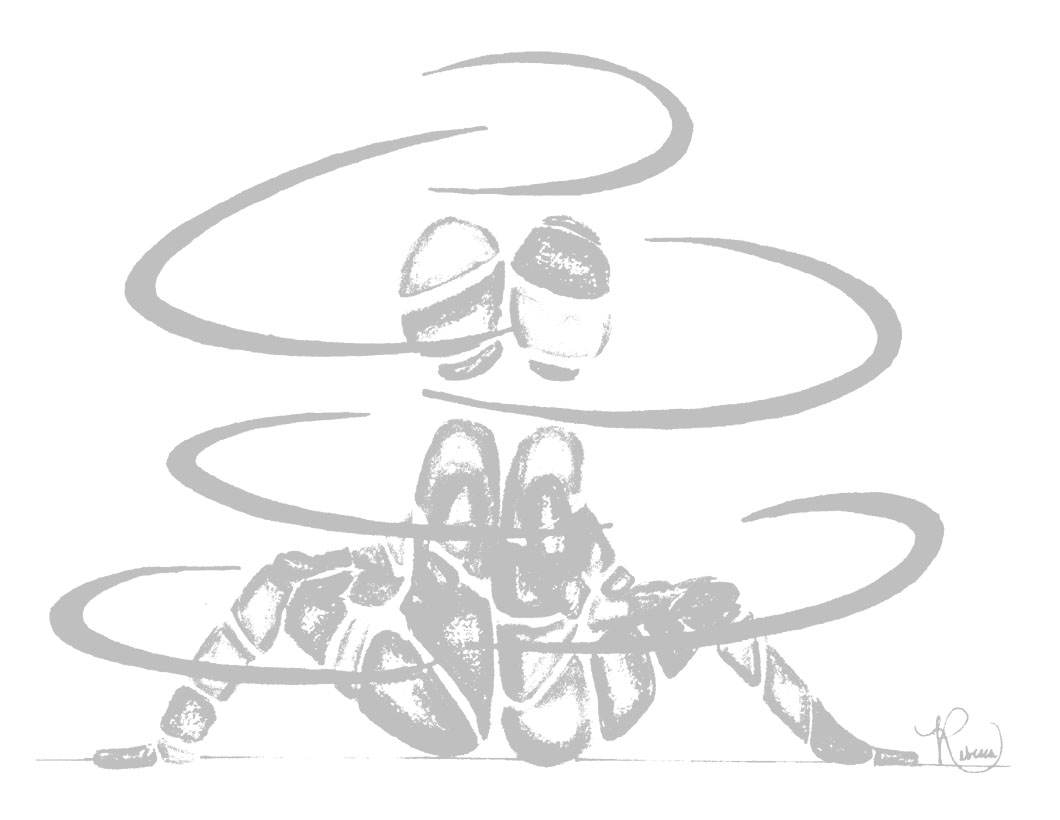
Sacrifice
by Heather OldhamYou are a dying breed,
Oh Christian who is
Christ-like
God forbid I should follow
That narrow path,
I claim, "It's not meant for me,"
In hushed tones.
And yet (and yet)
I know the seeds you
plant,
Unearth,
and Harvest;
I taste the fruit of such virtue
But I
cannot
bear
its Weight.
You are a strong breed,
Oh traveler who has welcomed
The Journey,
set deep in faithful eyes
I, too, see the Hole of Holies in our father's side
But I will not reach out to
touch,
Repair,
and heal it.
I am a plentiful breed,
Member of Sunday's
faceless crowd
We plant our tame faith
Where it
cannot
grow
To overcome us.
We lock it in our Bibles, our pews, our heads
And yet consume such
Sacrament:
Drinking His blood with repentance,
Breaking his flesh for forgiveness,
We calmly leave the altar:
Our sacrifices,
Intact,
Driving home.
for John
August 31, 2002
At this writing, Heather Oldham was a junior English and philosophy major at Baylor University in Waco, Texas. Art is by Rebecca Ward, a junior art major at the University of Texas at Austin. These poems and art are from the award-winning department called Peace Soup in Baptist Peacemaker. From Baptist Peacemaker, Volume 24 Number 1, Spring 2004)
#374
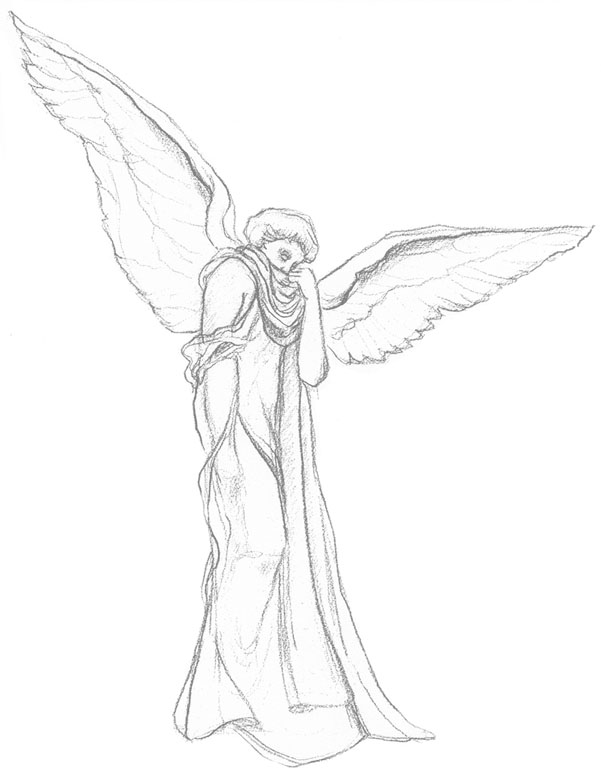
Funeral Sermon
Editor's note: Below are excerpts from words offered by Ken Sehested at Samuel Adam's interment on Saturday, August 14, 2004 in Louisville, Kentucky. Sam, eighteen, and his girlfriend, Jenny, were killed in an automobile accident.Ann Lamott says there are only two kinds of prayers:
Thank you, thank you, thank you
and
Help me, help me, help me.
I think she's right.
If I close my eyes and concentrate I can still smell the salty ocean breeze of Sunset Beach where for several years running I helped Laura and Sam [Adams] and Free and Aaron [Williams] and Jessica and Alayna [Sehested] build sandcastles at the edge of the surf.
Thank you, thank you, thank you.
And can it already be nearly two years ago that Laura [Sam's sister] and Tyler invited us to their Rocky Mountain wedding banquet, where Nancy [Sehested] guided these young lovers through their matrimonial vows? And where Sam performed an original composition in their honor? And where a host of us pronounced a hearty "AMEN" to the promises of constancy and fidelity said that day – promises to be honored through all the thick and thin of life, through both the parties and the perils that mark every companionship.
On some special occasions you say both prayers:
Thank you, thank you, thank you!
and
Help me, help me, help me!
It was in his first letter to the early Christian community in Corinth that the Great Apostle spoke these memorable words:
"Oh death, where is thy victory? Oh death, where is thy sting?"
Grammatically these are questions; but rhetorically they are more like bold dares spoken forcefully, even defiantly in the face of death. If some preschooler were to accurately translate this dare it would come out something like:
Na-nana-nana-na, you can't get me! Such fierce resolve in the face of ultimate threat!
These glorious lines have been sources of comfort to most of us at one time or another. But not always. When the open grave contains the remains of a dearly-beloved, our confidence isn't nearly as sure. And death's stinging puncture on our hearts doesn't heal with the pronouncement of this or any other piety. The sting hurts . . . still hurts . . . and our souls shrivel in bitter disbelief.
My God, my God, why have you forsaken me?
At just about every burial occasion I've been to, it never fails. Some well-meaning dufuss will publicly or privately say something like: "Well, God has his purpose in this tragedy, even though we don't understand it."
Just in case any of you are unsure at this point, let me say this as bluntly as possible: God had no part in this tragedy. To suggest otherwise is not only cruel but a blasphemy. God is not a terrorist who, in order to get our attention, resorts to murdering the people we love.
Of this I am as sure as the day is long and the night is dark.
Of this I am sure: God's heart has been ripped as deeply as have those of both Jenny's and Sam's families and friends.
Of this I am sure: Every tear shed in recent weeks has stained the face of Heaven.
Of this I am sure: That God is more taken with the agony of the earth than with the ecstasy of heaven.
But after this, my assurances come to an end. There is nothing I can say to make sense of this tragedy or relieve its agony. If I could have banished the sting by walking on my knees from Asheville to Louisville, I would have. The very earth itself howls in protest against having to swallow these brilliant children too soon. It is frightening to think that our very best sandcastles are not enough to protect our young ones.
Yet there is one exception to the end of all assurances. And it is this: God takes great delight in loving us.
It is this: That the terrors of breathly life will one day come to an end.
It is this: One day the only tears we will know will be those which come from convulsions of sidesplitting laughter.
It is this: One day the enmity between lion and lamb will cease; the poor will be raised from the dust; the boots of every trampling warrior will be tossed in the fire; the shamed will be ushered to a seat of honor; the meek will inherit the earth; and we shall all dance -- arm and arm with Sam and Jenny -- on the grave of death itself.
Thank you, thank you, thank you.
Some day you will again be able to say thank you. The day will come when once again praise will issue from your lips; when doxology will erupt from your lungs; when hope will arise with the sun and restful sleep arrive with the moon. Once again your dry bones will live, your grief will be melted with mercy, the tide of tears will recede.
For now, it is enough to pray
help me, help me, help me.
O Joy that seekest me through pain
I cannot close my heart to thee
I trace the rainbow through the rain
and feel the promise is not vain
that morn shall tearless be.
Ken Sehested is the founding director of the Baptist Peace Fellowship of North America and is now working as an organizer/peacemaker in Ashville, North Carolina. This sermon was printed in Baptist Peacemaker, Volume 24 Number 3, Fall 2004. The art, Prague Angel, is by Sally Lynn Askins, a professor of theatre design at Baylor University.
Hunger
#400"Mommy, I'm Hungry"
A Children's Sermonby Jeffrey Zurheide
I have offered a children's time during the morning worship services at our church, for the past five or so years, with several goals in mind: first, to give the children a sense that they are important; second, to incarnate in some way the approachability of God through my interactions with them; and third, to leave them with one simple truth from the Biblical theme of that service. (And, of course, the adults often gain much from the overflow.)
On one particular Hunger Emphasis Sunday, I decided to try to press home a simple phrase I had heard used by another worship leader at a Hunger Forum: "Mommy, I'm hungry."
In order to bring this all too familiar request to life (my own children probably say it themselves three times an afternoon), I asked five members of the congregation to stand up one by one and say, "Mommy, I'm hungry," in languages other than English. Our choices were Spanish, French, German, Japanese and Norwegian, but you may have other options in your faith community.
After each of the five finished reciting from different places in the sanctuary, I turned to the children and asked what that was all about. After receiving little feedback except puzzled shrugs and "I dunno's," I told them what each person had said: "Mommy, I'm hungry."
I then asked if they ever used that line themselves. They all came alive, saying things like "Yeah, when I get home from school I ask for a snack – and I say that just before dinner. I pointed out that, in many households in our culture, families eat three meals a day, plus snacks.
They all agreed, and after allowing them to tell me about their favorite snacks, I asked them what they thought the children of Sudan, Somalia, North Korea, or war-torn Bosnia snack on. They all pretty much agreed, "probably nothing."
I then spoke a bit about the relative abundance of food in our own land – supermarkets crammed with almost any food one could imagine, and all-you-can-eat restaurants. And then I tried to wrap things up with a few concrete "what we can do's."
I mentioned prayer and contributing to the various food drives in which our church participates, and I also invited them to walk in our town's upcoming CROP Walk, to help feed hungry people with their own two feet.
I concluded with another mention of "Mommy, I'm hungry," asking them to think about all of the mommies (parents) of the world who can only respond, "I know, but I have nothing to give you." We also closed with a prayer for our world's hungry children.
One never knows what children may glean from such an experience together. We did have a greater number of them participate in our recent CROP Walk, but beyond that, I pray that they might grow up with a greater sensitivity to the reality of hunger and poverty – and by God's grace decrease it tomorrow. For they are tomorrow's adults; tomorrow's citizens of the world.
Jeff Zurheide, at this writing, was a pastor in Oklahoma City, Oklahoma. From Sacred Seasons, Hunger Emphasis 1998.
#401

Sacred Dance
Connecting the Body, Mind, and Spirit in Worshipby Jessica Hastings Sehested
Movement, our first means of communication, has become lost in most of our worship services. We seem to have forgotten our innate, kinesthetic sense – for good reason, I suppose. Philosophers from Plato to Descartes taught that there was a distinct separation between the mind and body.
They believed the only way to the truth was through pure reason (through the mind), and this could be accomplished by transcending the body. Since dance uses the body, it was considered sinful and therefore detrimental to the search for truth.
During the Protestant Reformation, reformers banished dance from the church because they thought it was a distraction from God. Poetry and music remained because they could be easily regulated, but dance was too unpredictable and uncontrollable. Yet, have you known God to be predictable or controllable?
The Bible, however, refutes these ideas. The Hebrew word for "soul" appears frequently in the Hebrew Scriptures, but there is no word for "body." This suggests that the two entities were considered one. In the New Testament, the Greeks had one word for song, dance, and music. Again, one was not done without the other.
In our continual journey toward the Truth, most of us have neglected our moving bodies and, consequently, have not discovered the wisdom they can teach us. Through dance, we connect with the totality of our being-mind, body, and spirit.
Being aware of this totality reminds us how intricately connected we are to the Earth as the Body which gives us Life. This connection awakens us to our dependency on each other to sustain this Body-Life.
A Framework for Discovering Your Body's Creativity
I believe each of us possesses an innate gift of movement. Through reconnecting to this gift, we are able to move with intention in worship. Sacred movement or liturgical dance is any movement that praises God.
More specifically, it is interpreting words through movement. I have provided a few suggestions that will outline a structure in which your moving, creative self can begin to experiment, and the connection between mind, body, and spirit can be rejoined.
If the words dance and movement are intimidating, you might want to begin by learning how to have more body awareness. By yourself or with a group, start by simply taking a walk around the space you are in. It can be an open room, a backyard, or a sanctuary – anywhere.
First, take a few minutes to invigorate your senses by simply bringing focus and attention to each sense. You don't have to alter anything about them in order to be aware of them. After you are walking, you might want to take a few breaths to clear your mind and prepare it to focus. If you find your mind wandering during this exercise, bring it back into awareness of the present by focusing on your breath.
Spend a few moments centering the awareness of your mind and body on each sense. How do your feet feel against the contact of the floor? What sounds do you hear in the environment around you? What do you see around you? Notice any different smells in the air? What taste is lingering in your mouth? What does the air feel like against your skin as you move through the space? Are you remembering to breathe?
Next, begin to notice how particular body parts feel individually and in relationship to other parts of the body as you walk through the space. Where do you feel tension or ease? Does your head feel connected to the rest of your body? Which joints are moving?
Continue asking yourself these types of questions as long as possible. Remember to consider even the smallest of parts such as eyelashes and fingernails. Also try to distinguish the different feelings between bones and muscles. The more you do this exercise, the easier it will become.
Finally, as your body begins to feel more awake and energized, experiment with new ways of moving. What happens if you move by leading with your right hip? Forward? And backward? What other ways of traveling can you invent? What about changing levels, directions, or speed? Be creative, and allow your body to move on its own.
Choreographing Your Sacred Dance
Now, hopefully, you are more connected to your body as a whole. Before you begin the search for a text to choreograph a dance to, start by interpreting one word or phrase through your body in a still position or brief movement.
If you are working with a group, each person should have a different interpretation of the same word. The following are some examples of good interpretive movement words to begin with: light/dark, hope/despair, love/hate, peace/war, joy/sadness, life/death.
After interpreting these words individually, try dividing into a group(s) of three to five people and interpreting a word together in a still position. Experiment with other words, or challenge yourself to interpret the same word three or four different ways. Be creative and develop new ways to continue this exercise in order to help encourage the choreographer within you.
When you begin to feel comfortable with this exercise, the next step is to find a text in which you can start transitioning individual movements together to make a complete dance. In looking for an appropriate text to which you can choreograph (whether it be a song, poem, scripture, or other text), it is important to remember how the dance fits into the context of the service you are preparing. Does the dance flow well with the other elements in the liturgy? Who is your audience? What is an adequate length? It is always beneficial to choose a text that has strong images and is not narrative because this provides sufficient room for interpretation.
If you are struggling with where to begin your search process, I would suggest looking through the Psalms. Psalm 23 fits well in a service on hunger by remembering our connections to each other, God, and the Earth. Likewise, Psalm 107:1-9 gives thanksgiving for God's grace and bounty. Isaiah 58:6-12 expresses that our relationship with God is strengthened through our relationships with poor and oppressed people.
As you strengthen the connections between mind, body, and spirit, may you find yourself dancing to the glory of God.
Jessica Sehested has led people in profound worship experience through liturgical dance since childhood. Art for this piece is by Sharon Rollins. From Sacred Seasons, Hunger Emphasis 1999, Seeds of Hope Publishers.
#402
Hungering for Justice
A Litanyby Katie Cook
LEADER: God of Compassion, we stand before you with heads that are full of confusion and hearts that are heavy, for there is pain all around us and throughout the world. We know that you never intended this pain, and we grieve.
PEOPLE: As you once healed the sick and the blind, the lame and infirm, in Palestine, we ask you to heal again. We ask for healing of inner hurts and outer infirmities.
LEADER: Our sisters and brothers, God, in faraway lands and in nearby cities, are suffering from poverty and dying from hunger. We watch in mounting desperation, for we do not know what to do; we do not know how to stop the pain.
PEOPLE: As you once increased the loaves and fishes, the lunch offering of a small boy, we ask you to increase our humble gifts, and use them to feed the hungry multitudes.
LEADER: We want to be good stewards of your gifts. We search for ways to pour ourselves out for the needs of the world, but we do not always know the right way. Sometimes we stumble, and sometimes we grope.
PEOPLE: Maker of Light, illumine our ways. Guide our faltering steps. Show us the way to walk, and the way to give. Show us the need on our very doorstep. Help us to see your face in the faces of our brothers and sisters in need.
ALL: Grant that you might never say to any of us, "I was hungry, and you turned me away."
From Sacred Seasons, Hunger Emphasis 2001, Seeds of Hope Publishers.
#403
Beans, Rice, & Cappuccino
by Michele PerryBeans and rice and cappuccino steam
as we sit and talk
about a bowl of rice that feeds five for a day
about beans – a luxury
while we sit sipping mocha lattes
HUNGER – the faces of 38,000
children that cry from the silence
of day-old graves
(is God's love declared in the grave
or His faithfulness in destruction?)
what does that look like?
we can't conceive
every sip another one dies
voices that cry loud whispers into silence
in distant lands: Bosnia, Bangladesh, Brunei
in far off places across the street
Will we – can we hear their cries
while sipping cappuccino
and discussing beans and rice?
Michele Perry, a native of Orange Park, Florida, has done everything from serving at an orphanage in Bangladesh to working with children at a camp on Cape Cod to teaching backyard Bible clubs in US inner cities. From Sacred Seasons, Hunger Emphasis 2001.
#404
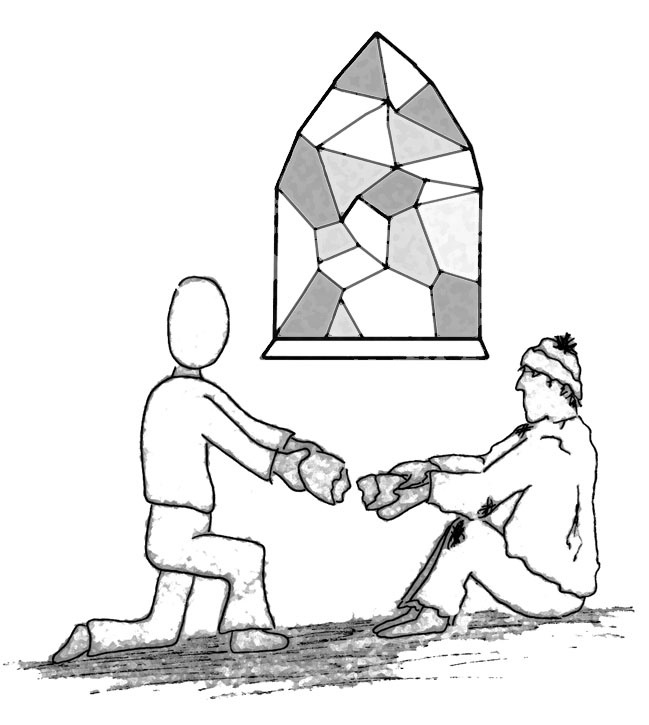
The Least of These
A Litanyby Katie Cook
READER 1: I am ten years old. I live in New Orleans. My mother works all night, and my brothers and sisters are afraid a lot. We hear guns going off all the time, and there are guys right outside our door selling drugs. I try to take care of the family when Mom's not around, but those guys are scary. I hope Mom brings us something to eat when she comes home.
GROUP: I was hungry, and you gave me food.
READER 2: I am eighty years old. I live alone in the house in Eastern Kentucky where I was born, and where I lived with my husband until he died. We have always been farmers, and we grew our own food. But now I'm too weak to plant anything, and all my friends have moved away. I'm lonely, and I don't know where my next meal is going to come from.
GROUP: I was hungry, and you gave me food.
READER 3: I am five years old. My mother is in prison, so I live with my grandmother in Detroit. She is old, and can't get around very well. She has to get food stamps to have enough food for us. When food stamps run out, she takes me to a place where we wait a long time, and then they give us groceries to take home.
GROUP: I was hungry, and you gave me food.
READER 4: I am sixteen. I'm from Bakersfield, California, but now I'm living on the street in Los Angeles. I ran away from home because my father roughed me up a lot, and now I don't know where to go. All the other kids on the street are working as hookers and dealers, and I don't want to get into that scene. But I'm hungry.
GROUP: I was hungry, and you gave me food.
READER 5: I am forty-six years old. I live in New York City. I was a soldier in Vietnam, and ever since I came back, things have just been wacky. I can't seem to keep a job, and I don't have any place to live, except this cardboard box. It gets cold sometimes, and it's hard to find enough to eat.
GROUP: God of hope, show us where to look for you, so that we recognize you in the faces of people such as these. Show us how to give to you, through them, food and water, shelter and clothing, comfort and companionship.
From Sacred Seasons, Hunger Emphasis Packet 1998, Seeds of Hope Publishers. The art for this piece is by Sharon Rollins and Katie Cook.
#405
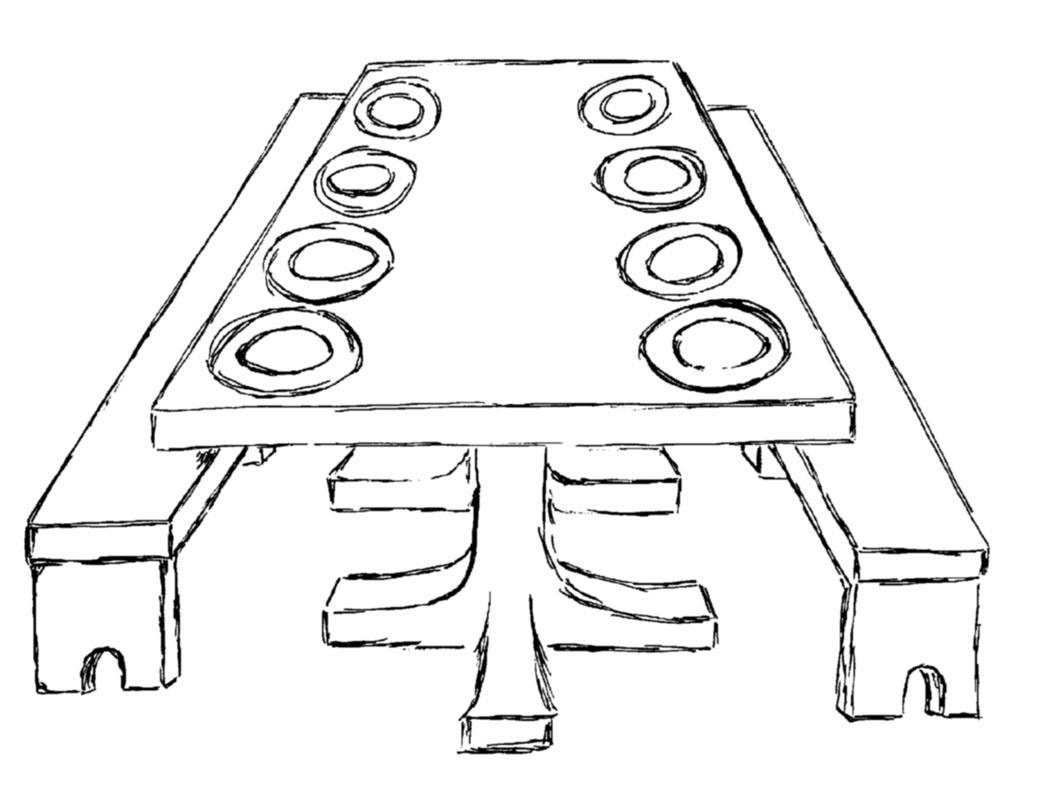
The Banquet Table
Poem and Readingby Michelle Perry
A certain Man was preparing a great feast.
He invited the many to come and eat,
to come and eat and drink His cup to be.
At the banquet table of Love,
At the feast of Forgiveness
Where Mercy serves and Truth lives
and Hope is found.
At the meal of Righteousness,
Grace abounds.
The servants called the many
to come and eat.
Excuses were made. One had a new field.
One had a new wife. All too busy
to come and
be His guests.
At the banquet table of Love,
At the feast of Forgiveness
Where Mercy serves and Truth lives
and Hope is found.
At the meal of Righteousness,
Grace abounds.
The Master said, "Since they did not come
when I called,
Go and gather the poor and lame,
the broken and shamed to come and eat
and they will be guests."
At the banquet table of Love,
At the feast of Forgiveness
Where Mercy serves and Truth lives
and Hope is found.
At the meal of Righteousness,
Grace abounds.
Yes, at the meal of Righteousness,
Grace abounds.
Michele Perry, a native of Orange Park, Florida, has done everything from serving at an orphanage in Bangladesh to working with children at a camp on Cape Cod to teaching backyard Bible clubs in US inner cities. The art for this piece is by Rebecca Ward. From Sacred Seasons, Hunger Emphasis 2001.
The Banquet Table
An Interpretive Reading for Youth
from a poem by Michelle Perry
Editor's Note: This reading can be done for the congregation in worship or simply among the youth as an interpretive exercise. It can be done with or without pantomime, but it would be more effective with pantomime (or dance, if your youth tend toward that kind of interpretation). If you choose to use pantomime, you can decide to use as many players as you like, or as many as you have. You could ask your players to dress up according to the roles they play, or you could ask them all to wear the same color. They might enjoy setting up a banquet table and festooning it with place settings, confetti, and flowers. Brainstorm with them and get them to come up with interpretative actions for each reading. Some of them could dress in fancy clothing, and some in rags. Or the same group could play both the original guests and the substitute guests. Encourage them to be creative.
FIRST READER: A certain Man was preparing a great feast.
SECOND READER: He invited the many to come and eat,
to come and eat and drink His cup to be.
THIRD READER: At the banquet table of Love,
At the feast of Forgiveness
Where Mercy serves and Truth lives
and Hope is found.
At the meal of Righteousness,
Grace abounds.
FIRST READER: The servants called the many to come and eat.
SECOND READER: Excuses were made.
FOURTH READER: One had a new field.
FIFTH READER: One had a new wife.
SIXTH READER: All too busy to come and be His guests.
THIRD READER: At the banquet table of Love,
At the feast of Forgiveness
Where Mercy serves and Truth lives
and Hope is found.
At the meal of Righteousness,
Grace abounds.
FIRST READER: The Master said, "Since they did not come when I called,
SECOND READER: Go and gather the poor and lame,
the broken and shamed
FOURTH READER: to come and eat
and they will be guests."
THIRD READER: At the banquet table of Love,
At the feast of Forgiveness
Where Mercy serves and Truth lives
and Hope is found.
At the meal of Righteousness,
Grace abounds.
ALL READERS: Yes, at the meal of Righteousness,
Grace abounds.
This reading was adapted by Katie Cook from a poem by Michele Perry. From Sacred Seasons, Hunger Emphasis 2001. Art for this piece is by Rebecca Ward.
#406
How He Broke the Bread
a dramatic reading for youthby Katie Cook
FIRST READER: Who was this man from Galilee? Was he the one? Several times people asked him that. "How do we know you're really the one?"
SECOND READER: Yes; how do we recognize him?
THIRD READER: I don't know; there was just something different about him. You knew somehow that he was set apart, and you wanted to be around him as much as you could.
FOURTH READER: There were lots of people who followed him around, listening to him and watching him, and trying to get close to him.
FIRST READER: Somebody said it was the way the dust motes danced around his feet when he walked.1
THIRD READER: Somebody said it was the way he talked, the way he touched people.
FOURTH READER: But I think it was the fact that he was so real. He was so real that he seemed, well, it's hard to describe what I mean. So real he was, I don't know, holy or something.
SECOND READER: I think I know what you mean. Like when he went to people's houses and ate with them, and laughed and told stories. And yet they came away changed forever.
THIRD READER: Even Zacchaeus; do you remember that? That little weasel. I couldn't believe it! Jesus went to his house and had supper with him.
FOURTH READER: And then Zacchaeus gave all of his money away. All of that money he had hoarded all those years.
SECOND READER: A lot of people did that when they got to know Jesus.
THIRD READER: The time I remember, though, is when Jesus was sitting beside the lake late one night, making breakfast for the gang.
FIRST READER: The Light of the World getting a fire going for breakfast by sheltering a spark with a pair of cupped hands and blowing on it. 2
FOURTH READER: We knew him in the everyday, ordinary – and yet somehow extraordinary, and maybe even cosmological – act of sharing food.
THIRD READER: Yes! Do you remember when Cleopas and his friend were walking to Emmaus? It was after Jesus was executed, and then there were stories about people seeing him alive. They were walking along, and this stranger showed up out of nowhere and walked with them.
SECOND READER: Yeah; can you imagine? It was their leader, and they didn't even recognize him!
FOURTH READER: Not until they talked him into staying for supper. There was something about that, the way he broke the bread.
FIRST READER: That's what they said; it was the way he broke the bread.
SECOND READER: Maybe they were onto something. Maybe that's how we recognize him.
THIRD READER: Maybe that's how we know each other. In the breaking of the bread.
FIRST READER: The sacred in the ordinary. The sharing of food.
ALL READERS: (pensively, thoughtfully) The sharing of food.
1. This is from Canadian musician/poet Bruce Cockburn's "Creation Dream," a song on the album Dancing in the Dragon's Jaw.
2. This is from the monograph on Darkness in Whistling in the Dark by Frederick Buechner.
From Sacred Seasons, Hunger Emphasis 2002.
#407
Feast from a Snack
A Monologue for a Childby Mark McClintock
based on John 6:1-15
Editor's Note: The following is a monologue meant to be delivered by a young boy. If you'd like to make this authentic, he should be costumed as a peasant child from the first century. He could be carrying a basket.
You should've seen it! It was a miracle! And it was me who helped Jesus do it. I mean, it was I who helped Jesus do it. I mean, it was Jesus who helped me.
We'd heard of him and the things he done – I mean, did – on the other side of the sea. But we never thought he'd pass through our little fishing village! When he did, it was like a holiday. A crowd of people was following him. Some of the men stopped working to see him. My father wanted to go, but he and my older brothers had to repair our boat.
Mama said, "Send Joel," – that's me – "he's no help to you anyway." To tell the truth, I am a little clumsy, and Papa easily loses his patience with me.
"But Mama," I said, "I have to go to shul."
"What for?" she said. "You think the rabbi will care?"
I don't think he would. He scolds me for asking too much – I mean, too many, questions, and he tells me I should work harder on my Hebrew.
Still, I didn't want to go. I knew this new teacher would think I was stupid, too. And besides, I hadn't eaten breakfast yet. Papa and my brothers took up all the space at our small table. Every morning, I waited until they were finished, and now I wouldn't get anything. Mama rolled her eyes and said one of her little blessings over me – the kind where she pulls me by my ear. She took some fish out of the salt and some loaves of bread and rolled them all up in a cloth and stuffed them in my arms and "blessed" me out the door.
So that's why I followed Jesus. It was a long walk up the mountain where I once got in trouble for playing when I should have been in shul. (Some of the other boys had skipped shul, too, but their parents were with them, so they didn't get in trouble.) I was starving, and I ate half the food Mama had given me along the way.
When we finally reached the mountaintop, it was amazing! All these sick people had come, or people had brought them for Jesus to heal. He made Obed, the lame beggar, stand up and walk. I saw it with my own eyes! He made blind people see, and deaf people hear, and crooked people stand up straight.
After awhile, I got tired of watching. Some of the other boys started a game of tag, but they didn't ask me to play. They hardly ever did. Later, they started complaining to their parents that they were hungry. I stuffed my bundle of food in my tunic. If they weren't going to invite me to play, I sure wasn't going to share my lunch with them.
Finally, Jesus stopped healing and started teaching. The things he said were different from the rabbi in my village. He talked about the meek being blessed and loving your enemy. And the stories he told! A shepherd who went after a lost sheep. And a son who was a bigger fool than me, but his father loved him anyway. I could have listened to him tell stories all day.
But then he stopped and told these men to find food for everybody. They looked at him like he was crazy. To tell the truth, I thought so, too. There was millions of people standing around Jesus. Or at least thousands. Nobody seemed to think of bringing any food except me. To tell the truth, I would've shared my food, but I knew my Mama wouldn't like it. Well, I knew she would've "blessed" me for being foolish. There was only a little left, and everybody would've laughed at me if I'd offered to share it. To tell the truth, I wanted to keep the rest for myself.
But then one of the little children near me started crying. I knew she was hungry. And I thought, maybe she needed the food more than me. So when the men came back to Jesus, I showed one what I had. I meant for him to take it to Jesus, but instead he took me with him. Now I knew everyone would laugh at me.
But Jesus just said, "Sit everyone down and bring some baskets." Then he took my food and said a prayer – a short one, not like the ones our rabbi says that make your back ache. And he started breaking the bread and the fish into little pieces. Somehow, he filled up a whole basket and handed it to me. Me! He asked me to help!
"You wanted to share it?" he said.
I went straight to that little girl and gave her some. Then I passed the basket around until it was empty. When I took it back to Jesus, I couldn't believe it! There were five more baskets full of fish and bread! It took forever to give it all out. And when we were done, there were twelve basketfuls of leftovers! I know I looked stupid standing there, staring at them. But Jesus put his arm around me and said, "Don't ever think what you have to give is unimportant. God can make a feast out of a snack."
Some things haven't changed much. The rabbi still says I ask too many questions. A few of the other boys still make fun of me, but most of the children invite me to play with them now. My Mama says my head has grown bigger, but my cap still fits, so I think she's just "blessing" me again. And I still have to wait for my father and big brothers to go fishing before I can have breakfast at the table.
But to tell the truth, after that day with Jesus, nothing is the same. No matter what anybody else thinks, I know I'm important to Jesus and I can serve God. And you know what? At Jesus' table, there will always be a place for me.
Mark McClintock is the director of PassportKids, a children's camping program. He lives in Birmingham, Alabama, with his wife Michelle, his daughter Maggie, and several ventriloquist's puppets. From Sacred Seasons, Hunger Emphasis 2003.
#408
I Just Want You to Know I'm Here
A Monologueby Katie Cook
You don't know me, but I'm a child of God, so I guess that makes me your sister.
I live in Zimbabwe, where, because of several years of drought and political unrest, there are no roads, and there is nothing left of what you call the infrastructure, so we all go without food regularly. I live in the rubble of Baghdad, hiding from those who fight, hoping the humanitarian workers can make it through to me and my children with food and clean water.
I spend my days in an Afghan refugee camp, making shawls to sell to people like you, hoping that someday my family can have a home again. I work as a prostitute in the mountains of Bolivia, hoping to learn a craft so that I can feed my children some other way. I live in the wreck of the Haitian capitol city, where a person who eats every day is considered to be rich.
I also live much closer than that – in a Sunday school room of an Arkansas church that took me in when my home was destroyed by Hurricane Katrina. I live on a reservation in South Dakota, where I struggle, in the midst of rampant alcoholism and spiraling AIDS cases, to escape the cycle of poverty. I live in the mountains of Appalachia where I help my family scratch a living from the land, and I dream of a high school education.
I also live in your home town. I'm one of those people that you rarely notice, right here in [Central Texas]. I represent 80 percent of the people, in some areas, who come to food pantries and emergency assistance programs for help. I represent women of all ages and circumstances.
I work full-time at the Burger King on Interstate 35. I can almost make ends meet with my salary, but not quite. I'm okay unless one of the kids gets sick or the old car breaks down. Because I'm working, my family lost some of the medical benefits we received before, and now I have to leave my children at home without supervision. But I'm determined to make it somehow.
I'm in the prime of my life, one of the first women to make it into an administrative job at a large factory. I was making good money – even putting some away. But the economy has been bad, and the company started laying people off. I'm one of the ones who got a pink slip. I've been looking for a job, but, meanwhile, my resources are dwindling fast.
I'm also an elderly woman, trying to survive on my Social Security benefits. I worked hard all my life, thinking that I would have enough from Social Security to make ends meet. I hate having to go to a social service agency and ask for help, but it's really difficult to get all the medications I need, pay rent, and then have money left over for food. You might not believe it to look at me, but there are some months when I have to choose between my medicine and groceries.
I don't want to make you feel bad; I just want you to know that I'm here. I'm here in spite of hard work, in spite of trying to be careful with resources. I want you to promise that you won't forget me, that you'll try to help make things better for people like me. That's all I ask, that you try. Until all of us – ALL of us – have enough to eat, every day.
From Sacred Seasons, Hunger Emphasis 2005.
#409
May We Be Uneasy
by John Stewart BallengerOur God,
Make of our living
a habit of giving.
May the basic needs of others
Be a priority
in our culture of magnified personal wants.
And may we be uneasy
eating the Lord's supper
as long as there are those that hunger,
as long as there are the least of these
whose needs are not yet met,
as long as Jesus is not fully present.
All this we pray in the name of the one whose voice disturbs us
from the very back of where we're comfortable.
Amen.
John Ballenger is a pastor in Baltimore, Maryland. From Sacred Seasons, Hunger Emphasis Packet 2000, Seeds of Hope Publishers.
#410
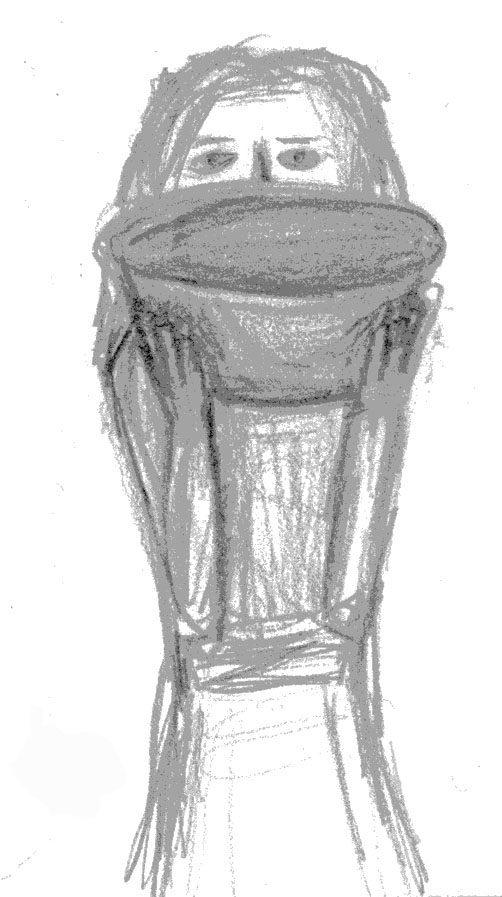
Remind Us of Your Face
A Responsive Call to Awarenessby Daniel G. Bagby
LEADER: Return our minds and hearts
to gratitude, O Lord!
PEOPLE: We live comfortable lives,
enjoy many freedoms,
share abundant resources;
and struggle daily not to lead
self-centered and protected lives;
LEADER: Teach us again the truth
about ourselves:
that we were born
for more than self-entertainment,
for active, and not passive, care;
PEOPLE: Teach us, who so often
remain spectators in life,
to cast aside our carelessness
and fear of service;
LEADER: Remind us of Your face in others,
when we see the eyes of hunger,
abandon, and hopelessness;
help us to recognize Your features
in the friendless stare
of a neighbor;
PEOPLE:Open our hearts
to Your silent presence
in the want of those
who tread the city streets;
LEADER: And teach us once again
that You were not crucified
in a clean cathedral
between two candles,
PEOPLE: but on a garbage dump
between two abandoned thieves;
ALL: That we may share Your passion
for changing wretchedness
into treasured living.
Dan Bagby is a dean and director of pastoral care studies at Baptist Theological Seminary in Richmond, Virginia. From Sacred Seasons, Hunger Emphasis 2002. Art for this piece is by Rebecca Ward.
#411
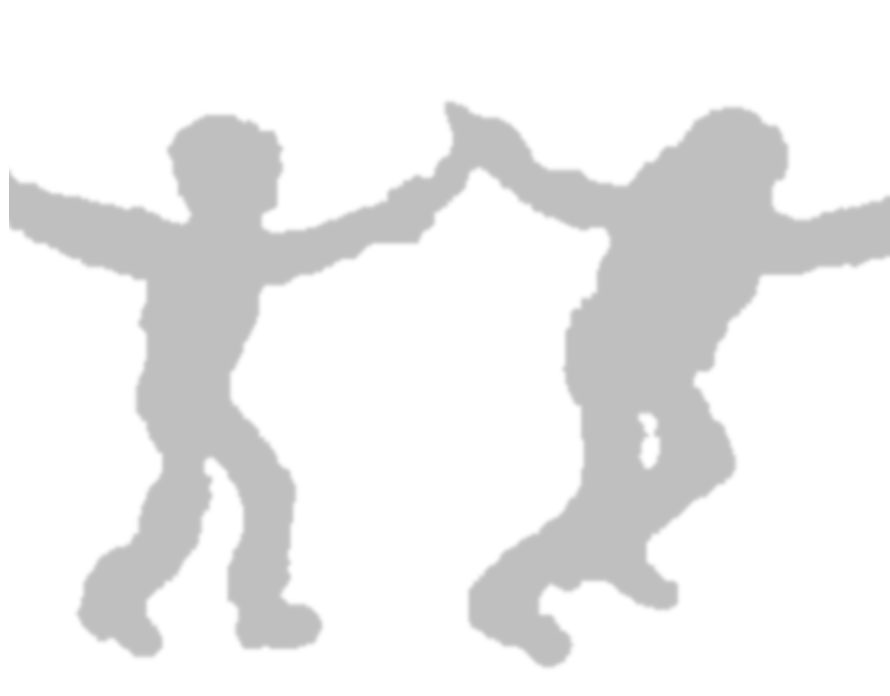
Change for the Children
A Hymn for Children's Sabbathwords by John S. Ballenger
tune: China 7.7.7.7 with Refrain
by William B. Bradbury
1. Children are of God's good grace;
in their joy, we see God's face.
In their laughter hear God smile.
We can see God in each child.
Thank God for children;
thank God for children;
thank God for children,
that's how we ought to live.
2. No child should be raised in fear;
that's our charge both far and near.
'Til each child grows up to play
their part in what God does say:
"Take care of children;
take care of children;
take care of children,
and change the way you live."
3. Children are the ones who'll pay
for poor choices made each day,
We their future must ensure,
lest our blunders they endure.
Think of the children;
think of the children;
think of the children,
and change the way they'll live.
4. Children all do need our care.
they need peace; they need clean air.
They need us for them to pray;
they need us to live God's way.
Love all our children;
love all our children;
love all our children,
thus change the way we live.
John Ballenger is a pastor in Baltimore, Maryland. He has written many dramatic resources for Sacred Seasons and other Seeds of Hope publications. From Sacred Seasons, Hunger Emphasis 2004.
#412
Jesus and Children
A Sermon for Children's Sabbathby Mark McClintock
text: Matthew 18:1-10
For an answer Jesus called over a child, whom he stood in the middle of the room, and said, "I'm telling you, once and for all, that unless you return to square one and start over like children, you're not even going to get a look at the kingdom, let alone get in. Whoever becomes simple and elemental again, like this child, will rank high in God's kingdom. What's more, when you receive the childlike on my account, it's the same as receiving me."
Matthew 18: 3-5, The Message
Imagine – isn't that a wonderful word? Imagine that Jesus were to walk into this room at this moment. I imagine we would ask him to teach us as he taught Peter, John, Mary Magdalene, and the others who followed him two thousand years ago. Perhaps he would preach a provocative and unsettling sermon, for which purpose I would gladly step down and give him this pulpit. Perhaps he would tell us a modern-day parable about a cloned sheep or the CEO of a Fortune 500 company who distributed corporate stock selflessly and equally among his employees regardless of rank or tenure.
At the very least, I imagine, we'd beg for a question-and-answer session. Jesus was always so good at those. Many of you, I'm sure, could think of questions of a deep theological nature or with profound ethical or political implications, but the question that comes first to my mind and sticks is, "Am I getting it right, Lord? Show me an example of someone today who lives the way you want me to live."
If the choice were mine, I would nominate any number of you present today, but I imagine that Jesus would probably walk down the aisles, take a beautiful preschooler in his arms, bring her back, and say, "If you want to enter the kingdom of heaven, change and become like this child. And if you want to welcome me, reach out and welcome little ones like this." Jesus insisted that we who are his followers receive these youngsters without hesitation. Now, times have changed since the First Century of the Common Era, and children in North America today lead very different lives than did those in Jesus' day.
Is the image of the Christian as a child as meaningful and appropriate today as it was two thousand years ago?
As a minister called by God to work with adults and children, I have to confess that my answer is not without bias. With the help of some of your children, I'm going to try to explain why I think Jesus' choice of a little child is relevant to us, here and now. I think there are at least four qualities of childhood that can be discerned in scripture as characteristics Christians should develop: humility, a hunger to learn, powerlessness, and dependence.
The first quality, humility, Jesus himself names in verse four of today's text, and his teachings are filled with references to a humble spirit: "Blessed are the meek," "All who exalt themselves will be humbled, and all who humble themselves will be exalted," "The king is coming, humbled, riding on a donkey."
The second quality, hunger to learn, I draw from the Gospel of John. Compare Jesus' statement here in Matthew that we must change and become like children to his instruction to Nicodemus, a teacher of the law: "You must be born from above, anew." Jesus makes it pointedly clear to Nicodemus that, in spite of all his knowledge of the Torah and the subtleties of Jewish religious law, developed over centuries, true spiritual wisdom requires a new beginning point and is a never-ending pursuit.
Even a very mature Christian – and we do mature in our understanding of God – must confess that the magnitude of God is so far beyond our full comprehension that none of us – not even the most gifted theologians – can profess to be experts. Throughout life, we continue to seek, to wonder, to question, and to learn. The third and fourth qualities, powerlessness and dependence, fit hand-in-glove. The Greek makes it clear that the child Jesus chooses is a young child, probably an infant. But the root word, pais, can also refer to a slave. Jesus instructs his followers not to "lord it" over others, but to abandon power, to be servants, "just as the Son of Man came not to be served, but to serve, and give his life a ransom for many." Earlier in Matthew, Jesus teaches the people not to worry but to trust God to provide even as those who are parents provide for their dependent children.
If we take Jesus' teachings seriously, children are more than little, immature people who need to be attended to in another building somewhere until they grow up and can contribute something to the church. Children are one of God's gifts to us to help us learn who we are to be. I am often astonished at the difference children – even very young children – can make in an adult's life. At age twelve, Jesus so amazed the rabbis in the Temple with his understanding of God that they failed to shoo him away even after three days! And he was a mere babe when he altered the path of shepherds and wise men, and elicited prophetic praise from old Simeon and Anna in the Temple.
Three years ago I stood in a hospital room, watching the life ebb away from my infant niece, Morgan. As I stood with her tiny body in my arms, the thought crossed my mind, "Why such a waste, Lord?" Morgan had been born with only ten percent of a diaphragm, miraculously survived a number of intensive surgeries, and spent nearly six of the seven-and-a-half months of her life in hospitals. Fastened to breathing machines and monitors, she was about as humble, powerless, and dependent as anyone could possibly be.
And yet, during her short life, her parents, sister, and grandparents were motivated after many years to return to church, joining a community of faith that has continued to be a vital part of their lives; mother, grandmother and grandfather all made professions of faith in Jesus Christ and were baptized; and countless individuals who came into contact with Morgan have testified to the way this sweet-spirited, uncomplaining, beaming, bright-eyed little girl helped them draw near to God. A wasted life? Hardly.
Then there was the eight-year old girl who taught me about grace. She was one of hundreds of children who found their way to Carlisle Avenue Baptist Church in Louisville, Kentucky, during my seven years there. Two years before my arrival, the church had built a beautiful recreation building for its members. I promptly established a Saturday morning recreation program and opened the doors to the children of the community. At first, very few youngsters came. The neighborhood was extremely transient, steeped in poverty; ramshackle houses filled with people who considered Christians as "those people who reject folks like us, maybe giving us a meager handout when we come begging for help and preaching to us to come to Jesus, join their church, and pay our dues when the plate is passed."
When I visited in the homes of our neighbors, I saw unspeakable cases of neglect and abuse, as well as dozens of struggling families doing their best against the odds to keep afloat. Quickly, I discovered that the way to build a bridge was to cut out all pretension, and approach people humbly, eager to learn their stories, with no display of holiness or prestige because of my faith or my position in the church, and to be open about my own shortcomings and needs and my dependence on God's grace – in short, to approach them like a child. The barrier of suspicion was soon lowered, and even those parents who could not overcome their own insecurities about visiting a church began to permit their children to come.
The young girl I mentioned was enjoying a soft drink during our Kids' Time at the gym. All at once, she awkwardly dropped her soda onto the floor, splashing its contents on herself, the carpet, and my khaki pants. As an adult, my natural instinct was to chew her out, or at least to cuss. But I looked at her face and saw the terror in her eyes that reflected countless punishments – perhaps verbal, perhaps physical, but clearly painful – for mistakes as trivial as spilling a can of soda. In that glance, I saw myself and all the thousands of mistakes I have made – large and small – against God, and never once have I had to fear the punishment I deserve. I grabbed a stack of paper towels, handed her half of them, and got down on the floor with her to sop up the mess. And in her eyes, I now saw relief, gratitude, and joy beyond measure.
Both of these children – my niece, Morgan, and the eight-year old in the gym – had lessons to teach me about my relationship to God. But I would have learned nothing had I not been willing to open my arms and receive them. The connection between becoming like a child and welcoming a child is no accident. Jesus knew that we can never truly be children of God until we are welcomers, if you will, of those who are humble, powerless, dependent. Quite literally, we must open our arms and embrace or take in hand the "little ones" of our world. Jesus' word choice here alters the definition of those we must welcome. "Little ones" refers to persons who are low in status, overlooked, or oppressed, regardless of age. Did this include children in Jesus' day? Most definitely. What about our very different culture today?
Allow me to call upon your imaginations once more. Listen to this modern parable from the Children's Defense Fund:
•Imagine a very wealthy family with five children. Four of the children have plenty to eat and comfortable warm rooms in which to sleep. One does not. She is often hungry, lives in a cold room, and sometimes has to sleep on the streets, in a shelter – or she may even be taken away from her neglectful family, which has plenty of room, and be placed in foster care with strangers. Imagine this family giving four of their young children three nourishing meals a day, but sending the fifth child away from the table hungry.
•Imagine this very wealthy family making sure four of their babies and toddlers get all their shots and health care before they get sick, but ignoring the fifth child plagued by chronic infections and respiratory diseases like asthma.
•Imagine this rich family making sure four of their children get stimulating preschool experiences and sending the fifth child often to unsafe or poor quality child care with underpaid and untrained caregivers responsible for too many children.
•Imagine having the fifth child depend on informal arrangements with relatives or neighbors when parents have to work, or being left all alone when they fall through.
•Imagine the family reading to four of their children, and leaving the fifth child unread to, untalked and unsung to, or propped before a television screen which sends out violence and sex-charged messages, ads for material things, and intellectual "pablum."
•This is the United States today, where one in five of our children ages two and under lives in poverty. It is not a stable or healthy family or a sufficiently compassionate one.
Here are a few statistics to lend stark truth to the parable. Each day in the United States:
9 children or teens are homicide victims.
9 other children or teens are killed by firearms.
180 children are arrested for violent crimes.
401 babies are born to mothers who received late or no prenatal care.
1,310 babies are born without health insurance.
2,016 babies are born into poverty.
4,248 children are arrested.
7,883 children are reported abused or neglected.
Do you have any doubt that Jesus' selection of a child as an example of a little one in need of welcomers is still relevant today? Five of the ten verses in our gospel passage are warnings against being the cause of stumbling blocks – or scandals – for our little ones. The stumbling blocks in Jesus' day may have been somewhat different from those today, but they are similar in nature. They are stumbling blocks like unaffordable medical insurance; underpaid child care providers and teachers; and an economic system that rewards greed and preserves the wealth of the powerful while progressively crippling those who are already struggling.
When we make choices that support these kinds of institutions, we are those of whom Jesus says "Woe to you!" Perhaps the worst offense of all is to simply look the other way while such unjust practices are happening. "Take care that you do not despise one of these little ones," Jesus says. The Greek is probably better translated, "do not look down upon" or "do not disregard" those whom society overlooks. Jesus calls upon us to be welcomers, to receive, to embrace, not to ignore.
What, then, must we do, as the people of Christ? First, we must change the way we view our own children. They are not merely lumps of clay that we must mold; God has formed them from the mixture of genes and chromosomes that have come down through generations of ancestors. We are, according to the Proverb, to "train a child in the way they should go," but the way they should go should be to follow God wherever God leads them.
If Abraham had simply done everything his father had wanted, he would never have left Mesopotamia and gone to the Holy Land. If Jesus had done everything his parents had wanted, he would not have stayed in the Temple for three days causing them great distress, and you can probably guess that it was not his mother, Mary, who wanted him to say and do the things that got him killed. Yes, we are responsible for helping our children learn to make good, safe, healthy, and thoughtful choices. Yes, we need to create safe and age-appropriate boundaries for them. But we must see our children as individual, unique creations of God, whom God has sent not only to learn from us but to teach us – to remind us of the way we are to live as God's children.
Second, we must see that this means that children are a vitally important part of the church. Should we hide away somewhere the role models God has graciously given us, or leave them for a few dedicated individuals to tend? Or should we find ways to include them in the whole life of our church? I've seen churches develop intergenerational Bible study groups, mission projects, retreats, and worship services, in which children, youth, and adults of all ages learn together, work together, and worship God together.
In some churches, every parent is asked to take a turn once a year, twice a year, or perhaps four times each year, to spend the worship hour working with children; and they think of it not as a chore or an obligation but as an opportunity. Perhaps the most beautiful thing of all is to see adults whose children are grown, or who have never borne children, act as spiritual parents and guides for the little ones in their congregations. Truly, these folks are welcomers and are blessed by Jesus Christ for the love they share.
Third, we must look beyond our own children and open our arms especially to those little ones who are suffering in our world. We can be political advocates for legislation that provides for the needs of all children, writing to our leaders about the importance of these children to our society now and in the future. We can provide financial support for good quality childcare and children's programs, especially in impoverished areas. We can volunteer time in the children's wing of a hospital, read to a class in a local day care center or school, or tutor a child in an abuse shelter. We can even open our church's doors – and our arms – to children in the local community by providing a weekly recreation event or club meeting. Yes, we will get messy, we may be inconvenienced – but, after all, isn't that what Jesus did? And if we follow his example and keep our eyes and ears and our minds open, we will probably learn some important things about ourselves and our relationships to God.
I've asked five of the children of the church to stand with me here. Perhaps their faces are familiar to you. You've watched some of them grow from infancy. [Five children of the church come from the congregation and stand next to Mark.] Now, I ask you: Which of these five should we abandon to a life of malnourishment, inadequate care, poor health, and utter despair? There are thousands of little ones, every bit as precious to God as these are to us, right outside our doors– humble, powerless, dependent, and just plain hungry. We can either be welcomers or stumbling blocks. Which will you be?
Mark McClintock is the director of PassportKids, a summer children's camping program. in Birmingham, Alabama. From Sacred Seasons, Hunger Emphasis 2003.
#413
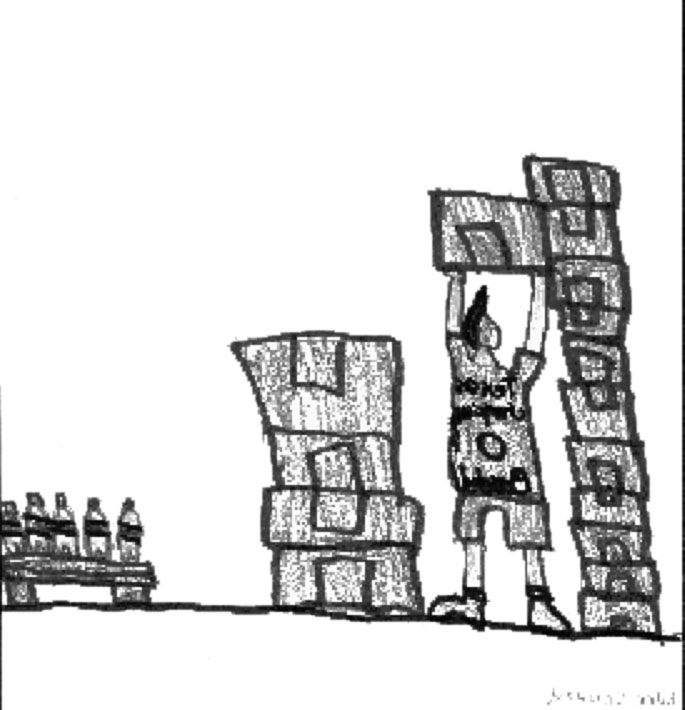
Hungry for Hope
Children's ActivityHow We Created a Day Camp on Hunger
by Megan Sims and Katie Cook
It had started out to be just an innocent lunch in Waco, Texas. We had met to kick around ideas for a one-day-a-week summer camp for the elementary-aged children of our church. We (Megan, the interim children's minister, and Katie, the editor of Seeds Publishers and a youth leader in the church) realized that, when planning summer activities for children, one usually considers amusement parks, zoos, movies, and other kinds of lively attractions. But Megan wanted to do something a little different.
Megan said that she wanted to spend the time touring local nonprofit organizations that deal specifically with issues of hunger and poverty. We talked about the need to make missions a part of the children's church curriculum before they reach the youth group and go on mission trips.
We discussed the vast resources within our own church and community for teaching the children hunger and poverty awareness. So why not create a program that not only teaches hunger and poverty awareness, but also brings the children into contact with the programs and people who work in social ministries locally?
So the Hungry for Hope day camp was created. On Fridays during the summer, the children met at nine in the morning at the church. They came with sack lunches, sunscreen, bug spray, and an eagerness to learn and do missions work.
On the first day we issued Hungry for Hope press credentials (laminated and complete with a Polaroid photo identification) which they wore around their necks. We also issued notebooks and pencils, along with a few disposable cameras. We explained that they were now reporters for a new publication, and that, in August, we would, together, compile their stories, drawings, and photos into a newsletter.
We began each day by learning about what it means to be hungry. The children completed short hunger simulations in which they learned how their own country compares with others and how a person with little money must live.
The kids also studied the different definitions associated with hunger and developed their own ways of understanding what the word hungry means. For all of these activities, we used The Children's Hunger Educational Kit, distributed by the Presbyterian Hunger Program, PCUSA.
After the classroom time each Friday, the children went to an organization in the city for hands-on missions experience. On the first day the group traveled to the Central Texas Senior Ministry (CTSM) to see the central kitchen for Meals on Wheels. As one carload arrived at the building, one of the children rallied the others, saying, "Let's go get a story."
A CTSM staff member led the group in a tour of the facility, and the children immediately whipped out their notebooks and started asking questions, taking copious notes. The tour guide was astonished and delighted.
The children then delivered meals and talked (and sang, in one case) with Meals on Wheels recipients. During other Fridays they washed vans at Mission Waco (an urban poverty ministry), pulled weeds at the World Hunger Relief training farm, and sorted food for the Caritas of Waco food pantry. After returning from the mission encounters each week, the children ate lunch and worked on their stories. Their businesslike attitude and enthusiasm for creating a newsletter was surprising and contagious.
In August, the children presented a program for the church and distributed copies of Hungry for Hope, composed of their page designs, drawings, photos, and stories. The response from the church and from the host organizations was overwhelmingly positive.
At the beginning, we might easily have questioned the sanity of taking children into the heat of a Central Texas summer to do missions work. However, looking back, we realize that no theme park or movie could surpass our experiences.
The kids pleaded to return to these organizations to do more mission work. What better response to a program could we want than the desire to learn and do more?
Megan Sims now works for the State Department in Washington, DC. The day camp took place at Seventh and James Baptist Church in Waco, Texas. Seventh and James is the community of faith that houses the Seeds of Hope offices. From Sacred Seasons, Hunger Emphasis 2004.
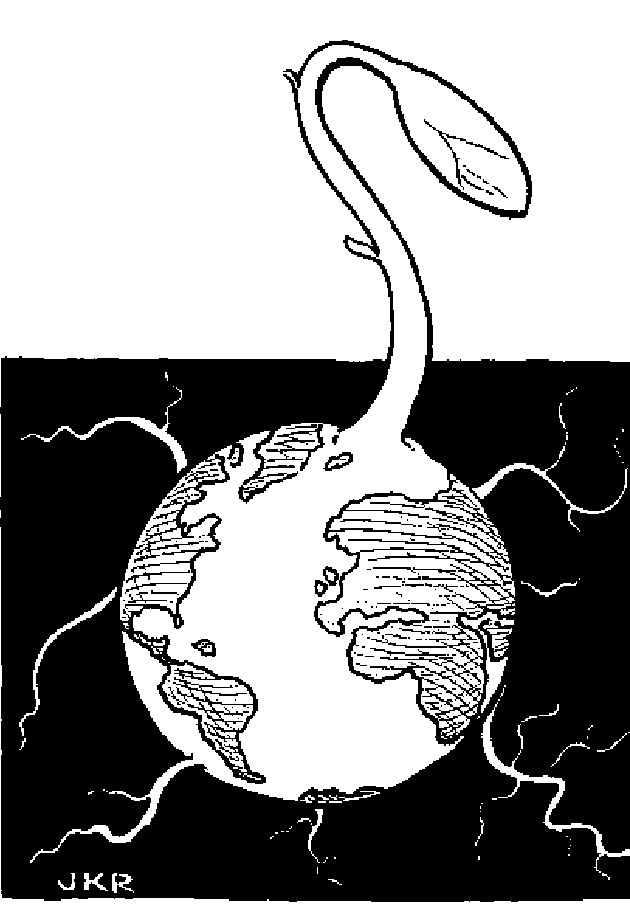
© Creative Commons
(originally ©2005 Alternatives for Simple Living)
Worship Alternatives collection compiled, edited and prepared by Katie Cook from Seeds of Hope and by Gerald Iversen.
The collection contains sermons, worship items and art. It is part of the CD-ROM Simply the Best: Over 30 Years of Alternatives, available from the ELCA Archives.
Archives Index | Home | Key Free Resources
Page update 2 Juiy 2014
Simple Living Works! * SimpleLivingWorks@Yahoo.com
BLOG: SimpleLivingWorks.WordPress.com
| Blog INDEX
PODCAST |
Podcast INDEX
VIDEOS
[ YouTube.com/SimpleLivingWorks ]
MISSION: Equipping people of faith to challenge consumerism, live justly and celebrate responsibly // An all volunteer educational organization.